#I NEED TO GET THIS RPG AT SOME POINT IN MY LIFE-
Explore tagged Tumblr posts
Text
batshit insane statement but part of harrisville's theme sounds kinda like part of uhhhhh. one fantasy life song. i don't remember which part but it has fantasy life vibes. they probably had the same composers honestly sfdlkfjlksfjkfkjsf-
#puppy rambles#yo-kai watch#i think that everyone here should play fantasy life it is amazing#the writing is very similar to yo-kai watch's. the music doesn't have the Spoopy Vibes obv but it's still similar in some ways#the gameplay's great action rpgs or whatever aren't very common. the lifes are all great but also woodcutter's the best one#i'm so fucking excited for fantasy life i y'all don't understand#i should replay fantasy life before fantasy life i comes out. i never actually got to the point where i can do dlc stuff despite buying it-#level 50 is just an absurd level to need to get to. you end the game at like level 20 usually-#... what is it with level-5 and rpgs where you beat the game at a fairly low level compared to most rpgs lkdsfjsdjkfskj-#granted. my only other rpg experience is pokemon basically. and the team kirby clash games but those don't count-#i got derailed. harrisville sounds like fantasy life music thanks for coming to my tedtalk
4 notes
·
View notes
Text
I LOVE YOU TURN BASED RPGS!!!
Good afternoon gamers!!! I miss F.inal F.antasy. I miss it a lot-
#Sorry for being annoying today I just really miss it-afkshfjsjdj#Those types of games always the perfect thing that keeps me calm as I wait for KH Content#But the lack of KH Content...Me not touching a Turn Based RPG in a hot minute..#It's getting to me-afknsfknsfj#And also Y'know. a lot of real life stuff which is directly responsible for why my mood has been all over the place lately-#But we don't talk about that here! <3#Maybe I just need some time offline... Dedicate it to myself..#Hmmm...Maybe I'll do that! Idk if I'll do that soon but I'll probably do that at some point#I really need it Methinks!! I feel like I've been a little annoying to deal with lately so logging off for a bit will help I think!
16 notes
·
View notes
Note
what are your hobbies?
I have a garden that I love to work in every day.
During the lockdowns, I learned the difference between having a garden, and tending a garden. It turns out that I just love to tend my garden. I love to walk in it, smell all the smells, prune it and tie it up where it needs it, keep the soil healthy, and leave it alone when I've done enough.
In a lot of ways, I use my gardening time as a metaphor. One that was particularly meaningful to me lately came when I was pruning this feral tomato that showed up in one of my beds late last year. As a general rule, when I get any volunteers, I leave them alone, except to keep them away from things I've planted myself. But in this case, it was growing so fast and getting so out of control, I had to rein it in a bit, with some pruning and gentle redirection of the parts which were tied to the trellis.
I started thinking about the individual stalks as parts of my life experience: here's one that doesn't have anything growing on it, but if I follow it all the way to this point, I can see that it's providing support and nutrients to this huge, thriving, massively flowering hunk of the plant. It turns out that part may look like it isn't doing anything, but without it, this other part that's gorgeous wouldn't exist.
I could have just looked at it and seen a stalk that wasn't doing anything. I could have easily pruned it right then and there, and only after would I have discovered this lush, thriving, beautiful part of the plant that can't exist without this other part. I was so grateful that I took the time to look at the whole thing, to see that bare stem in context, to appreciate it.
I don't know if this particular metaphor lands on you, but it landed real hard on me. It inspired a wonderful moment of reflection and gratitude, and I also got excited for the ... I mean, it's at least a dozen, but maybe more ... little cherry tomatoes I'm going to get when they finish ripening.
I have recently noticed that, as long as I can remember, I have felt like I can't slow down, like I can't take time for myself, that I should always be working or trying to work. I've been working on healing as much of my CPTSD as I can, and part of that includes doing my best to give myself permission to slow down, to take entire days or even weeks off, because I have earned it. It's such a struggle for me.
And that's where my garden is a metaphor again: it may not be full of blooming flowers or tons of vegetables right now, but that doesn't mean it isn't growing. Maybe it needs to be watered and fed today, and tomorrow, I can just walk through it, and enjoy it.
It's one of my very few hobbies that are mostly private, that I keep for myself. I freely and enthusiastically share my love for classic arcade gaming, Tabletop and RPG games, and all my super nerd shit, so I like that I have this one thing that's just for me.
491 notes
·
View notes
Text
Why aren't comics more common in TTRPGs?
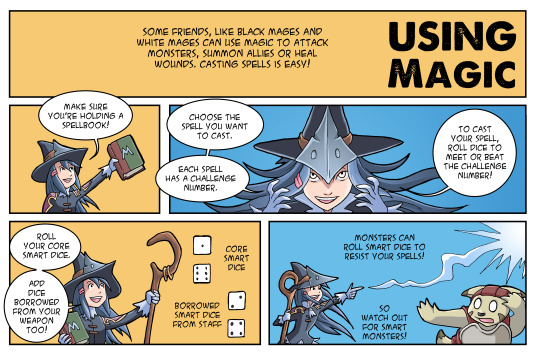
(This is about game design and presentation) In school one of the things I discovered is that I have trouble absorbing info from a big text book. And most TTRPGs are presented as text books. Once I understand the basic information in the book (chemistry textbook or RPG sourcebook or whatever) I can deal with the book on my own terms. I can dive into individual parts and learn, and slowly absorb the book as a whole. But I need help to get there. I need an access port. Sometimes this comes in the form of someone explaining the book to me. Explaining the rules of the game or the outline of an essay. This is great, and gives me a way in so I can absorb and master the book myself. But I don't always have someone in my life who can do that. Interestingly, I don't have this problem with novels at all. Narrative feels easier to access, at least for me.
In school I also discovered Scot McCloud's Understanding Comics. This is a pretty fantastic book which I'd recommend to everyone. It helped me understand how I process information. More importantly, it helped me understand the different people process information in different ways. I hadn't realized that at age 16, although I was starting to suspect it. Before I started making comics or games I used to be a teacher. As a teacher I could see that some of my kids were struggling with the information I was giving them, in the same way I had struggled in school. I started using comics in class to help reach these students. I'd draw little comics on my handouts or on the whiteboard to explain what we were learning. The goal wasn't to provide an entire lesson in comics form. I'm not Scott McCloud! Instead, I was trying to find an access point for my students. An on ramp. A port of entry to the ideas and material we were covering so they could engage and eventually absorb the information. It worked so well. It worked like magic. Why don't we do this more in TTRPGs? I used comics in my early games, Panty Explosion Perfect and Ocean. These were narrative comics, not rules comics, but the goal was to provide both an example of what play looked like (from a narrative standpoint) and a point of access for players who weren't sure what the game was or how to engage with it. My thought was that if you understood what the game was supposed to look like it would be easier to approach the rules. (A short comic from Ocean. The book has a bunch of these)
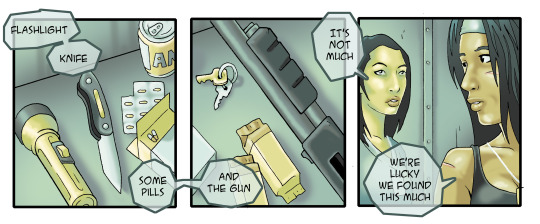
When my brother Nick and I started working on The Magical Land of Yeld I knew I wanted to use comics more directly as a teaching tool. Especially because part of our target audience was new and younger players who might look at a big text book (Yeld is a giant 400 page hardcover) and just bounce right off it. Like I did in school and like I often do with big games. So I needed to teach with examples and illustrations, and especially comics.
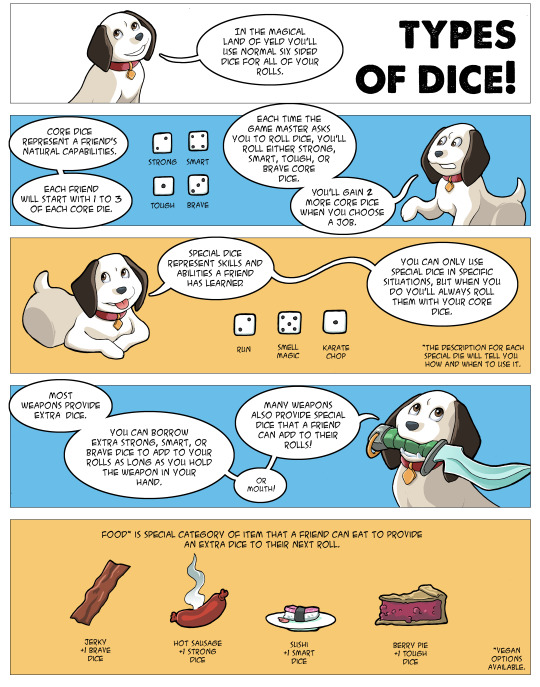
The first comics you'll encounter in the Yeld book are narrative, and designed to get you into the ideas and themes of the game. But in the first few pages we also start sprinkling in rules comics. These are presented along side the rules text. They don't replace that text, which is important. The text explains the rules in greater detail, and includes information that just couldn't be added in a single page comic. Instead, the comic is intended to be a point of access to the rules text. A player can read the comic, understand the basic concept, and feel comfortable engaging with the text. That's the goal, to make players comfortable and to make the rules text accessible.
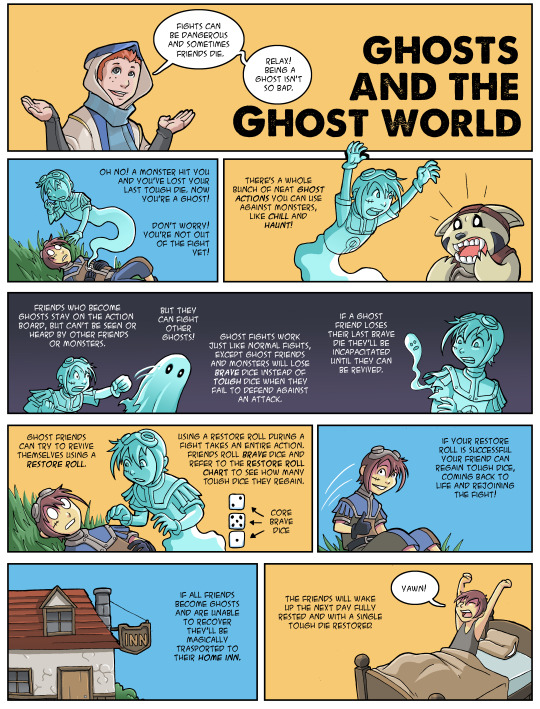
We use comics to teach basic game mechanics, but we also use them to explain specific player facing systems. Sometimes these are things that really do need a comic to explain them, but sometimes we use comics as lures to draw player attention to mechanics that we're afraid they might otherwise not engage with. For example, in playtesting we found that when characters died during a fight the player would just sit there for the rest of the fight and not engage. It turned out, since you don't do anything in D&D once you die (except slowly die more), most players assume that's how all games work! So they hadn't even noticed that in Yeld you become a Ghost and get to ghost around and do fun Ghost stuff! I decided to create a comic that not just explained this but drew attention to it and showed why it was a fun (and important) part of the game!
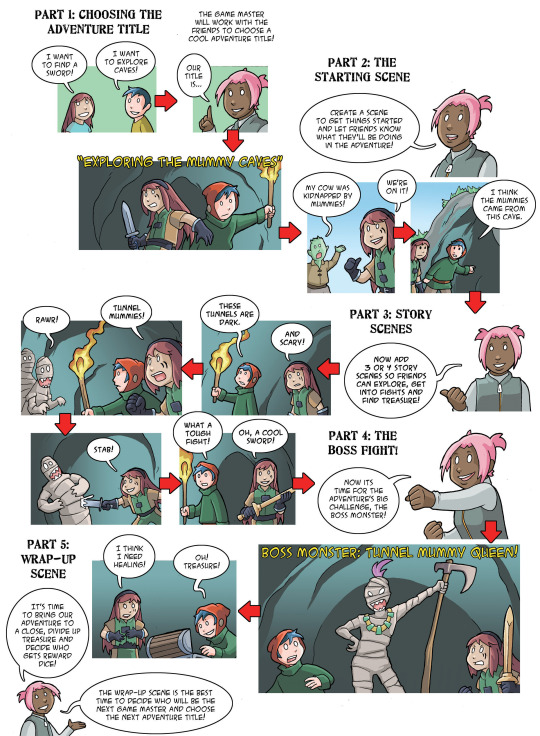
Structure of play isn't always obvious to players, especially if they're new to TTRPGs or have only played D&D. You pick up habits from the games you play the most, and since most gamers play nothing but D&D there is a tendency to assume EVERYTHING works like D&D. Yeld doesn't, so we decided to take nothing for granted and make comics that very specifically show what a session of play looks like. In this example, it may not look a lot different from D&D, but the adventure is specifically divided into 5 parts. The comic illustrates these parts in a way that is easy to understand. The accompanying game text explains each part in more detail and illustrates how they are important to play. The comic serves as a ramp that gets players to the info they need.
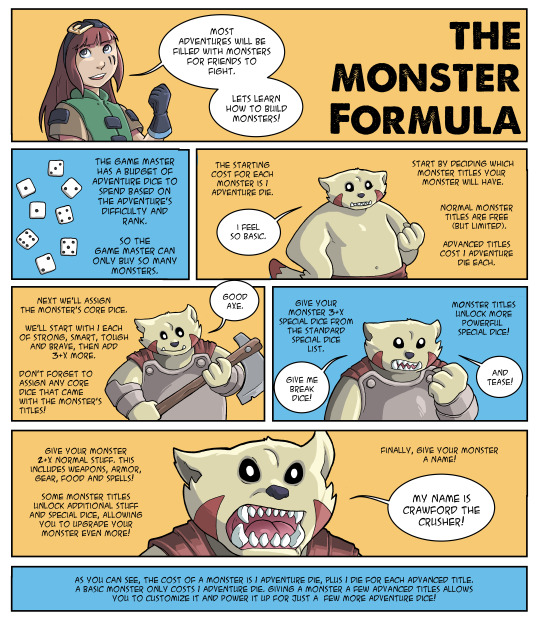
Not all of our comics are player facing. Yeld has a rotating GM (which is awesome, btw), and this means every player gets a chance in the Game Master roll. Which means every player needs to understand how this roll works. Comics like this one, which explain how to build monsters to use in your game, help make the process easy to understand. Again, its about building a point of entry for players. A player might say "I don't want to GM, it sounds to complicated!" But its not. You just need to make it easy for them. Make the mechanics and responsibilities easy to understand. Show why they're fun! In Yeld, its important that each player takes on the GM role from time to time, since we're building a story together. Making it look fun is important! Comics help with that. What's more fun than comics?
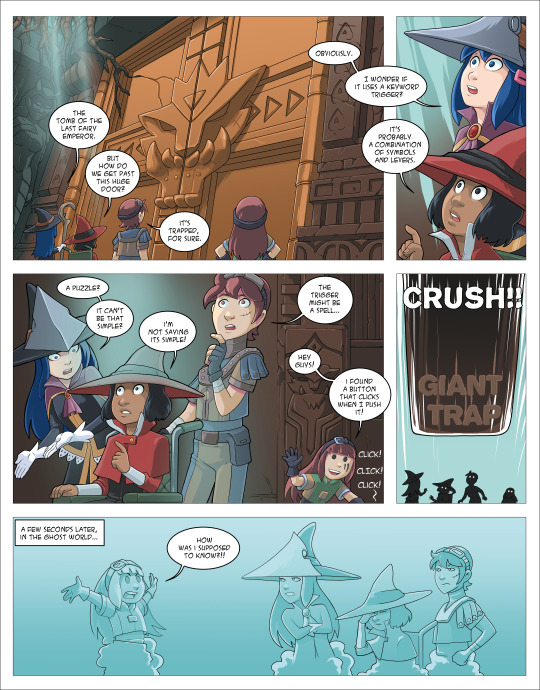
Narrative comics are important too. At least for Yeld. I don't think every game benefits from them (although I always love seeing them). Narrative comics show players what the game is supposed to look like. What the characters do and say. What environments they visit. Narrative comics set a tone. Narrative comics let new players understand what a game is about immediately! We can hand a Yeld book to a new player or customer and they know what's up in seconds, just by reading a short single page comic. That's a powerful tool. So why don't more games use comics? Part of it is that game creators are usually not comic creators. There's not a lot of crossover. That always surprises me, but both disciplines take a lot of work. Who has time for both? Even when you have game designers that are comic creators, they often don't include comics in the games (Lancer???). I don't think this means game designers don't recognize the value of comics. I've had this conversation with so many game designers, and they usually agree that comics are useful tools. But if you don't know how to make comics, making comics for your game can be daunting. What rules should you focus on? How do you present that information in comic form? How many comics should you make? How do you hire someone to make comics, anyway? Hiring artists is expansive, btw. You know that, of course. Hiring an artist to make a set of comics for your game could cost you thousands of dollars (or more), depending on what you want. Of course, you can try to make your own comics. And you should! Really! A poorly drawn comic is not necessarily a bad comic. The point is to get your information across to your reader. to provide a point of access. You don't need great art for that (although great art can help attract people to your game). Stick figure work just fine. Here's an example, the layout for the Tea Dragon card game. Another artist took this layout and redrew it in their own style. But my goal here was to be simple and concise with my explanation of the rules. To make the game accessible.
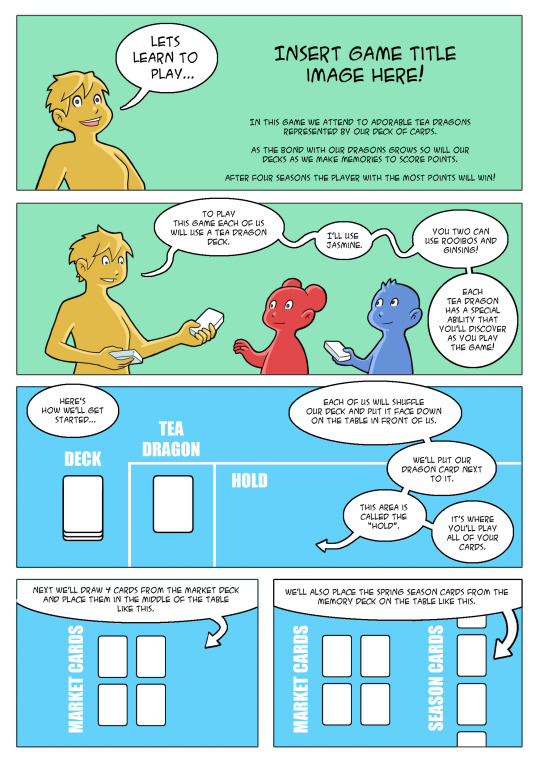
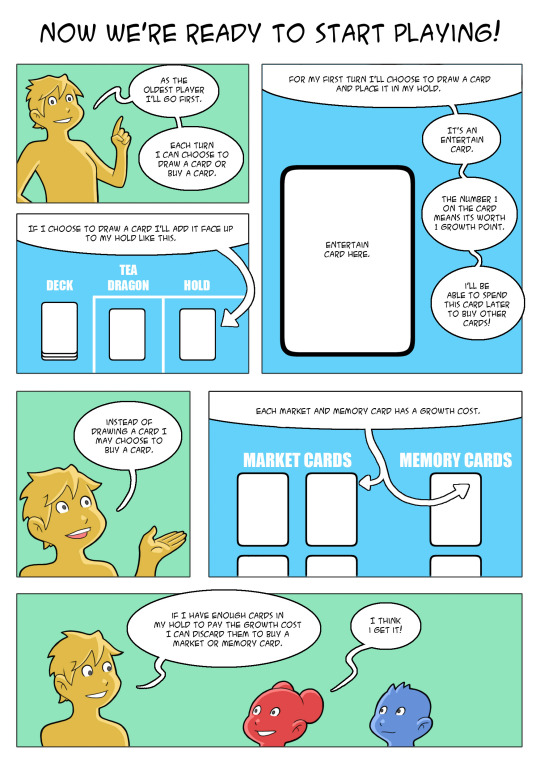
There's a few more pages of this, but you get the idea. The purpose is to explain, and make the player comfortable with learning more. The art matters to the extent that it serves this goal. In fact, flashy or complicated art can get in the way! You'll notice in that most of the Yeld rules comics I posted above the art is pretty simple, with solid color backgrounds. You want to make your comics as easy to read as possible, and that includes avoiding clutter, overpacked word balloons and messy layout. Readers are easily distracted. It doesn't take much for them to set down a book at all. A complicated phrase or hard to read font can often be enough. And once they set a book down they may not every pick it up again. That's more true for a big text book than it is for a comics, but its still true for a comic. So our goal is to make our comic the easiest, smoothest point of access it can possibly be. So easy and smooth that the reader can slide right into the rules text without noticing! Here's my general process for creating a rules comic. This is from my friend Brian's game Scofflaws. I start by taking the basic mechanics that need to be illustrated and breaking them down into panels. The goal is to make each panel readable and not overwhelm the player. At this point I'm just doing a rough sketch. It may not eve=n be readable, but that's fine!

Next, I refine the text and art. I decide on the exact language I'll use, and I finalize where characters and other elements will be placed. As you can see, the actual layout didn't change much here. Sometimes it changes a lot!
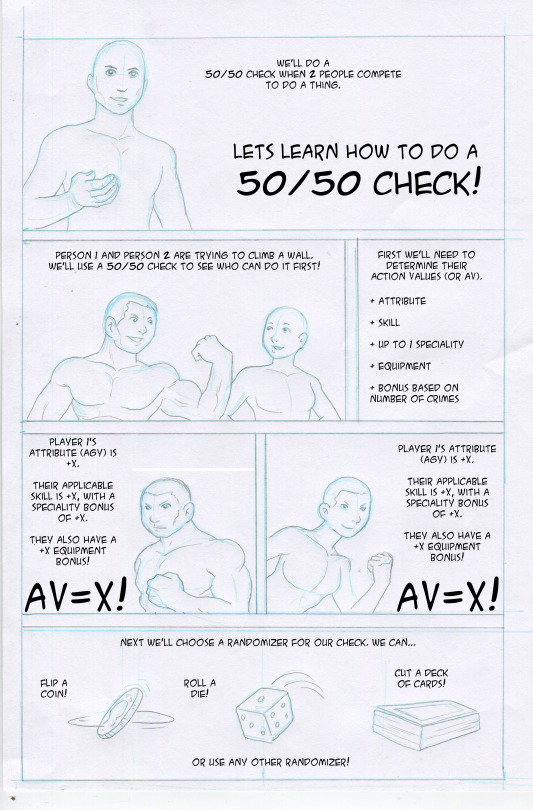
Finally, I create the finished art. Honestly, the previous step was just fine. It explanans the rules I wanted to explain. But this last step allows me to add in some narrative flavor. The first panel contains a complicated background in order to present the game's setting. The characters look like the kind of characters you'll play in the game. This isn't nessacary for presenting rules, but it helps present the game as a whole. You want players to engage with every part of your game. The last thing you want them doing is picking up your dungeon crawling game and going "Oh, this would be great for playing Star Wars!"
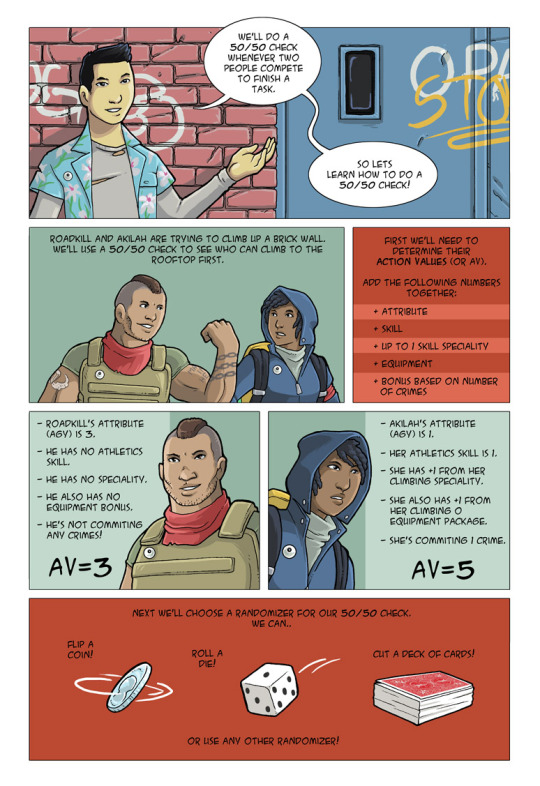
(I probably shouldn't have chose than shade of red for the background. It makes the text a bit hard to read!) So again, why aren't we seeing more comics in games? Its not as if they don't exist at all, and I'm personally always excited to see them. I recently opened the Final Fantasy RPG box set and was so happy to find the rules were accompanied by cute comics. And there's lot of other examples (maybe you can post some in the comments). But I think comics are a clearly underused tool in game design and presentation. And as a comic person, let me tell you that you're leaving a valuable tool on the table if you're not considering using comics. Are they right for every game? Maaaybe not? But I think MANY MANY MANY games could benefit form them. Are they expensive? They can be. Are they hard to make? They can be. Are there people you can go to for advice? Hey, my door is open.
#game design#ttrpgs#ttrpg design#ttrpg community#ttrpg#roleplayinggames#comics in games#comics as a teaching tool#teaching with comcis#put comics in your game for fucks sake#yeld
177 notes
·
View notes
Text



hello manosouta/saintknight enjoyers. i bring you this: married in red AU
for those unfamiliar with married in red, it’s a short thriller RPG by studio investigrave (other games by them are elevator hitch and dead plate). the game is free as are all their other games and i highly recommend it!!
SPOILERS FOR MARRIED IN RED AND AAI2 UNDER THE CUT
unlike my sunjiao dead plate au i don’t have that solid of a story for this, mostly because i haven’t had the chance to replay the 2nd and 5th cases after finishing the game to fully grasp and contextualize their dynamic, so i will probably be able to elaborate on this more after doing that AND possibly replaying married in red.
i had a few routes for this to go down which i’ll talk about below.
the basic premise is that simeon is attending bronco’s wedding (to some unknown figure cause i couldn’t figure out anyone that could generally fit the role i needed so you can imagine whatever you want).
in this story, simeon and bronco were still childhood best friends, but after nearly freezing to death in the locked car, simeon ended up hospitalized and rather weak for most of his life with high susceptibility to illness. bronco promised he would always visit simeon whenever he was sick or in the hospital, but simeon never felt that bronco truly made up for his actions that day.
the whole thing with the president and the double doesn’t really happen i guess? the focus is what happened during their childhood but artie’s still gotta die unfortunately 🤷♀️
under the impression that carmelo was bronco’s father and killed frost, simeon made sure that bronco would also have to face the loss of a loved one and sabotaged his wedding. bronco would’ve wanted simeon to be his best man, but ultimately decided not to put him in that position due to his health. unlike in MIR i think simeon had to have been invited but just as a guest.
here’s where i came up with multiple versions of the story. you can choose whatever seems to make most sense or whatever you like more 🤷♀️
the first is just following the events of MIR. simeon kills the person bronco intended to marry, frames bronco for the murder, and gets him arrested for revenge, promising that he’ll visit bronco every day in prison!!!
the second involved a bit more manipulation on simeon’s part. although i’m not sure how much he could really pull this off but who knows that guy did some whacky shit. in this version, simeon informs bronco that something dangerous is going to occur at the event: someone there is a threat, and bronco, as the bodyguard he is, needs to neutralize it. simeon then tries to frame it so that bronco’s fiance was the threat and his pride in his profession took priority over his fiance and killed them.
i think the second one is more interesting but i’m not as confident in its plausibility for these characters but 🤷♀️ i would love to hear people’s thoughts if they have any :]
anyways, making these AUs with SIG games is such a blast, especially editing the screenshots and writing text. maybe i’ll make more for either the dead plate or MIR AU’s at some point but that’s a later me thought
simeon having a similar hairstyle to frost was on purpose btw. also god i hated drawing bronco’s hair wtf is going on with that guy 😔
thank you for reading !!!!
#my art#fanart#digital art#artists on tumblr#art#artists of tumblr#digital illustration#aai2#aai2 spoilers#aa investigations#simeon saint#simon keyes#horace knightley#bronco knight#manosouta#saintknight#married in red
120 notes
·
View notes
Text
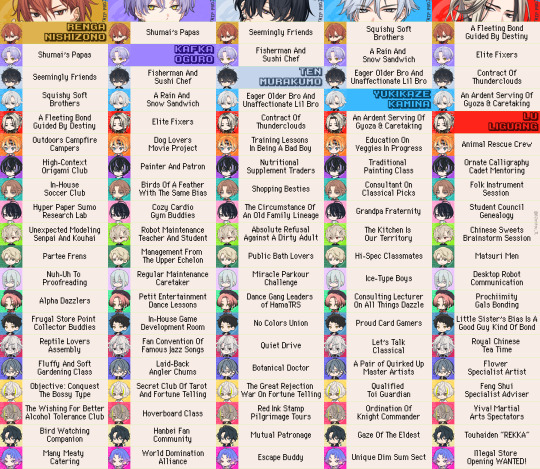
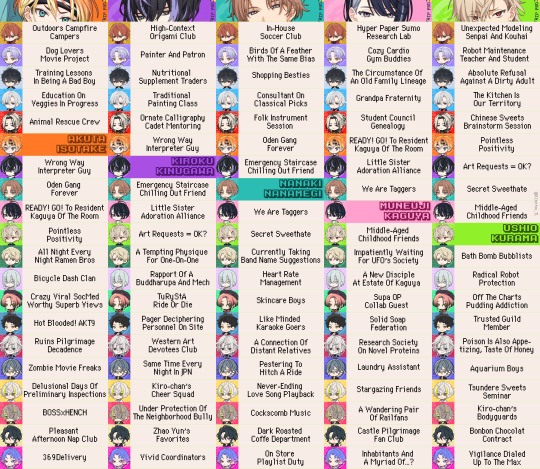
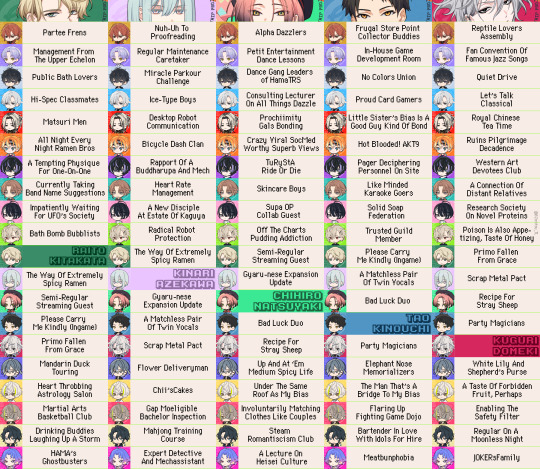

Previously translated pair names that had been posted to Twitter. However corrections had to be made (misinterpretations & an instance of mistranslation), so this is version 2.
Note: This is the only translated thing I will be posting, I am not off hiatus. I had been meaning to archive this before my hiatus, but I also had to fix some things, which is why there was a delay.
Please consult to this post only regarding pair name translations done by me (82mitsu), any other posts or reposts you might see of this chart is the older version. (Previous version has been deleted, but I'm unaware how far the information had spread.)
If any other corrections need to be made, feel free to contact me and I'll make them as soon as possible.
Below follows an extreme lengthy TL note breaking down some pair names, it's a lot of text, so be warned once you unfold the read more.
A lot of research went into these due to 18TRIPs tendency to mix up words, use Gen-Z slang that hasn’t been picked up by everyone yet (or limited to TikTok) and make up their own words (“Omotenashisto” -> “Hospitalister”). I used dictionaries, searched forum results, looked up how people use these words on social media, went TikTok digging, etc.
I tried my best to localize in a way that should make sense even without added context. I only explained the ones that I thought might needed some more back-up in a cultural sense or because it was a specific JPN thing. Thus, not everything has been explained. However, I hope things are clearer compared to the first version that was posted. For Renga & Yukikaze: For ぽゆぽゆ (poyupoyu) there is no definition or anything for this word, but from context clues and digging through how people used it, I deduced that it means something soft and squishy like a plushie or cheeks, so to say. For Renga & Liguang: かりそめの宿縁 (karisome no shukuen) is a Japanese saying about a fated connection of bond that only lasts for a brief moment, but leaves a deep impact on your life. For Renga & Raito: Party is mispelled in the katakana as “paachii” and not the usual “paatii”. Renga has a tendecy to say English words wrong. While “friends” is spelled the correct way, both words have been “mispelled” to drive the point home. For Renga & Kinari: なぁぜなぁぜ (naaze, naaze) is JPN Gen-Z slang from Tiktok. It’s a statement made as an act for complaining, with a bit of sarcasm and irony thrown in at times. Like, “I said I wanna diet but I ate a big meal anyway! なぁぜなぁぜ” or “I’m an idol but I get more anxious doing improv than performances! なぁぜなぁぜ”. Best way I can describe the usage in this context is Renga is throwing a bit of a self-aware tantrum as to why Kinari would correct him. (As mentioned earlier, he isn’t good at English). I guessed a close equivalent would be “nuh-uh”, since that is a dismissal of someone else’s opinion without actual good reason, even if the other person has a point. For Renga & Netaro: まんまん (manman) means “a lot” but I also believe it’s a reference to meatbuns (nikuman). For Kafka & Yodaka: Hanbei is Takenaka Shigeharu, a Japanese samurai from the Sengoku era. He was known for being Toyotomi Hideyoshi’s strategist. For Liguang & Yodaka: 闘牌�� (touhaiden) is related to Mahjong stuff. 闘牌伝 seems to be an old timey Mahjong video game with RPG elements. Rekka is a fighting game term, and I will quote the website The Fighting Game Glossary by Infil on this: “A type of special move that has multiple stages, as long as you input more commands to continue the sequence. Not all multi-part specials can be called rekkas though; a rekka tends to have exactly three distinct parts and will move your character forward along the ground with each new input.” For Akuta & Nanaki: They went to the same kindergarten and were grouped together in the “Oden Class”. Japanese kindergartens, from my understanding from researching, tend to have a name for their class, rather than a number. To give an idea what such names could be, in 2019 the website hyenasclubs hosted a poll of most commonly used names for classes, and the top 3 were “baby chick” (hiyoko), “peach” (momo) and “dandelion” (tanpopo). For Akuta & Muneuji: My take on はっけよい輝矢部屋 (hakkeyoi kaguya heya) is a bit of an elaborate bit joking with Princess Kaguya of the Moon (from Tale of the Bamboo Cutter) because I was wondering why they suddenly opted for Muneuji’s last name instead of first. (I might’ve also just overestimated Kaguya Heya being some joke on Kaguya Hime). Hakkeyoi is what a referee shouts at the start of a sumo wrestling match. For Akuta & Ushio: I think ポジティブに腕押し (positive ni ude oshi) is a take on 暖簾に腕押し (noren ni ude oshi) that means something has no effect or is pointless. Lit. it means “pushing a curtain with one's arm”. For Akuta & Tao: Akuta Nine is a joke on the baseball movie Gyakkyo Nine which is an adaptation of the manga of the same series, I believe. The movie is referred to as GK9, hence I made it AKT9. For Akuta & Ryui: The original is OYAxKOBU which comes from 親分子分 (oyabunkobun) meaning “boss and his underlings”. Akuta also calls Ryui by “Oyabun”.
For Kiroku & Nanaki: Weebs who watch highschool anime should be familiar with this, but emergency staircase refers to the hallway stairs in a JPN highschool that are sometimes used as chilling out spots by students. For Kiroku & Chihiro: TuRyStA is the clothing brand they wear. 18TRIP has a various selection of clothing brands, which each character having a preference for one or another. For Kiroku & Yodaka: Zhao Yun, as quoted by Wikipedia, “was a military general who lived during the late Eastern Han dynasty and early Three Kingdoms period of China.” For Ushio & Raito: Some heavy freedom was taken with バスボムしゅわリスト (basubamu shuwaristo). After considering how to approach it in the most sensical way, I decided to translate it as “bubblist” due the other options being “hand sign list” or “bubble list”. I thought リスト might function as in -ist, like dentist, artist, guitarist. しゅわ comes from しゅわしゅわ which means bubbly. Although bubblist isn’t not that common, it is sometimes referred to entertainers that do bubble performances (in English). And I think it made more sense than “hand sign list” or “bubble list” to say the least. This was also taking in consideration how 18TRIP, as explained in the intro, gets very creative with its language usage. For Raito & Nagi: Mandarin ducks symbolize “soulmates” of some kind in China. In other words, Mandarin Duck Touring is more along the lines of “Motorcycle touring soulmates”. However, I find the mandarin duck reference and interesting pull compared to just “soulmates”, so it was kept as is. For Kinari & Ryui: “Super Darling Gap Inspection” is more along the original lines. “Gap” in Japanese is usually used in the context of when someone acts one way, but unexpectedly, can act a different way. Ex. A very shy person shows they can be super vulgar, that can be considered a “gap” of some kind. In English, people are more familiar with “gap moe”, thus gap moe was used. For Tao & Nagi: Might be a reference to Yokohama’s Zo-no-hana (Elephant Nose) Park. For Toi & Yodaka: The original is more along the lines of, in the most literal sense, “going around raisins circle (of friends).” Toi likes raisins, but Yodaka doesn’t, so Yodaka passes them onto Toi. I’ve turned into on a play on “sharing is caring” since that’s a common concept in English.
287 notes
·
View notes
Text
I want to break down a common point of conflict when addressing NPD stigma.
A lot of hangups people have tend to be along the lines of "but I DO see a lot of people with actual NPD who are acting in toxic or abusive ways".
This will be kind of long, so bear with me.
Point #1: People are way more likely to be diagnosed if they exhibit "stereotypical" symptoms.
There's this image of NPD as a disorder that is only present in those with patterns of destructive behavior towards others. Many therapists have this conception. (Shockingly, the mental health field is not perfect & without stigma.)
Gonna copy-paste this here from my other blog (so forgive me if you've seen it before), because it's a good example.
Three people are criticized at work. Their boss yells at them for their performance in front of everyone. Person A gets mad and defensive. They yell back, using cutting remarks as a way to try and ease the distress they feel. Person B acts really mature and responsible the whole time, nodding along and agreeing and promising to do better, just desperate to maintain and improve their status. Desperate to be liked. Later they go home and handle their distress through self-destructive means, and spend the next few months overworking themself to the point of illness. Person C doesn't seem to respond much at all. They go quiet and seem distant. They don't lash out or lash in, but for the next month or so, their productivity drops. They simply aren't able to focus on work or self-care, no matter how hard they try. The stress is overwhelming. All three of these people have the same root issues, but only the first would be labeled a narcissist. Outwards behaviors and presentations don't reflect the pain, distress, and difficulties with life that are underlying them.
So, three main things happen.
There ends up being a higher rate of people with destructive behaviors who are diagnosed with NPD
The people who don't particularly exhibit behaviors and are considered ""too nice to have it"" are overlooked entirely (and never get any sort of help for their underlying issues, yayyy)
People are more likely to be more honest about "ugly" symptoms / symptoms that are frowned down upon than they are in other mental health communities.
(Also some people decide to act super edgy about it, which is annoying but here we are. Some of them are trolls.)
(And while I'm at it, some people are misdiagnosed with NPD because a psych sees someone who committed a violent crime and is like "uhh slap them with the Evil Asshole™ disorders!! no further thought given.")
Point #2: People who have messed up are not inhuman monsters who deserve no help or support
While I do think it's important for people to understand that patterns of toxic behaviors aren't the ONLY way NPD can present, I'm not going to let the conversation stop at "some of us are nice though!!"
Human beings aren't RPG characters who can be sorted into "monster" or "ally". Every single person has done something hurtful, has messed up, exhibits some sort of behavior that puts strain on their relationships sometimes.
So I'll bullet point some aspects of this that need to be talked about.
People without NPD also commonly exhibit toxic behaviors, but people ignore that nowadays. Either they armchair diagnose anyone who's slightly rude, or they only focus on it in pwNPD and ignore it in themselves or others. NTs can be jerks too, and they're probably less likely to acknowledge it than pwNPD who are constantly watching and checking themselves and analyzing their behaviors and attempting to do better.
Assuming that NPD makes someone abusive doesn't help anyone. Can it impact behaviors, and make it more difficult for people to be self-aware? Of course. But an important step in healing from any mental health condition (especially personality disorders, ime) is realizing that you're not inherently ""bad"", and that you can take responsibility for your actions and learn to deal with things in constructive ways. Just going "NPD makes people bad, full stop"- other than being a mean shitty thing to say- absolves people of guilt and asserts that there's no reason for them to try and improve.
Yes, it's okay for people to hate their abusers. Their abuser. Not an entire community of people who happen to (maybe) share a trait with them.
Building on the above point, people tend to go in defense mode when they hear things like "pwNPD who have acted in toxic ways can learn to improve their behavior", "people shouldn't be saying awful things about folks with this condition", etc. because they automatically try to apply this to their abuser. Interpersonal situations are very different from society-wide mental health access. No, don't stay with your abuser expecting them to change, and don't hold onto the hope that they will. No, don't censor yourself or your hatred or anger towards them. Just don't make blanket statements about a disorder that they may or may not have- blame their abusive actions, not their mental health.
"I hate you for your abusive actions and the harm that you caused me." =/= "I hate a group of people because of an inherent unchangeable part of them that's tied directly to severe childhood trauma they suffered. Because of it, they're evil and unlovable and are incapable of change. They're inhuman and will never experience real connection with others." ..........See the difference??
Even if there were a disorder with a 100% rate of toxic douchey behaviors, I'd want the conversation around it to be changed. I'd want different words to be used to divide up the spaces and conversations and resources, so that survivors of abusive or toxic behavior can get help, but that the disorder still has space to be treated. Otherwise, there are zero resources for healing. Nothing is being done to help these people or solve the issue. They're just told they may as well not try. They're blocked from healthcare entirely, despite how the entire point of being diagnosed with a condition is supposed to be to treat it.
There's a wide range of people who have NPD- it presents in many different ways, a person who has it may or may not exhibit harmful behaviors- but no one deserves to be denied treatment or told they're unlovable because of a condition they have that was formed from trauma.
Speak out against abusive behavior. Don't destroy healthcare for a medical condition.
988 notes
·
View notes
Text
Bullying, Mean, and Honest Truths About Spirituality


Under the cut is an honest and crude description based off of my own bias and opinion of new people joining Spiritual practises, the occult, or seeking magic and mysticism.
So you want to start practising the Occult.
You are drawn to the idea of Mysticism, Magic, the Occult, and “Witchcraft”. Let me say that again, but louder.
You.
Are Drawn.
To the IDEA Of Mysticism, Magic, the Occult and “Witchcraft.
A lot of people like the idea of pets.
Pets are fun! You get a cat or a dog and they hang around and you imagine yourself going for long walks or hikes with a canine companion, or sitting at home and enjoying the company of a furry feline. Maybe it isn’t a dog or a cat or a common household pet. Maybe you want a bird! They are fun, right?
You see people on the internet through videos on whatever platform you’re wasting your hours on. You fantasize about what you would do or have. You spend hours entertaining this fantasy while looking at everyone else’s lives and situations.
You are drawn to the idea of something.
And then you ignore the important detail that these things require work, time, and dedication.
The Occult is just like people and pets.
There’s more people that i know that should not have pets than people that I know are responsible pet owners.
This, for me, is the same with the occult. Only, if you choose to neglect the Occult practise you claim to be drawn to, there isn’t really a penalty like a vet bill or a dead creature that you were supposed to be responsible for, for your negligence.
“Oh, I’ll just pick a “class” like an RPG and I’ll roll with it.”
Will you though? Will you dedicate the time and energy to do research on the subject matter you claim to be interested in? And not only will you give it the time and energy to just begin with the research, but will you also put in the dedication to put it into practice?
Be realistic with yourself. What are you actually going to do? Are you capable of maintaining routines and managing yourself and keeping up with the demands of the occult? Or are you just whimsically interested in it because it sounds “cool” and you had some friends in school that played with some tarot cards so now you think you’re a witch.
Let’s pretend you do actually have the self control and discipline to dedicate yourself to a spiritual path and practise. Let’s pretend you have that kind of integrity (but let’s be honest, you and I both know that’s a load of wash.)

Most likely, you’re coming from an Abrahamic Background, aren’t you? In the least, you’ve spent a lot of your life surrounded by vaguely misshapen ideas of “some sort of binary system where there’s good and bad spirits” or something or another and demons might be a thing? You don’t really know. But you took a class once that talked about Greek and Roman gods or maybe the Norse and Celtic gods, so you know there’s Gods out there! So that’s a START! Let’s go!!!!!!!!
You can just pick a god and run with it, right? Like, who cares? Just pick what makes you go “Yeah that’s neat and cool. I’ll take this out for a spin.” and pretend that you’re somehow deeply connected to this being. You read something or another about this deity or this pantheon at some point or another (or something like that). Just google search and read the Wikipedia page and waste a few more hours on it till you’re a Reddixpert on it! You have everything you need and a few days later you throw down a candle and incense and you’re blown away by feeling a strong connection to this god! HOLY COW! It’s working?! Let’s face it, you’ve not been connected to anything at all in your self obsessed life for a long time. So you think it’s “Special” when you get an answer. It’s not.
Sorry, sugar. You’re not special. You’re not a little special little sugar plum fairy that is adored by the gods. Because, believe it or not, you have to build relationships. But not just that, you’ve just pulled a “White Person” move. Most likely, you didn’t consult with or have any discussions with practitioners of the ethnicity and belief system you are interested in. Nor did you research the culture and how the religious and spiritual beliefs of those people manifest. I would suggest you learned some or a little bit or even all of the language of the people that the religion belonged to, but let’s be honest again with one another, you don’t have that in you for sure. You chose to take a God from a Pantheon and chose to take it entirely out of context. Congratulations! You pulled a White Colonialism Move so good that you took it to a spiritual level!
What? You thought you could just pick whoever from wherever and just rip them out of their culture, place, language, and people and water it down till it suited you? What is this, Wicca?
It might be! If this sounds like your idea of fun, check out Wicca. They’re full of it. You have gods from across all seas (Except for some reason the Pacific? Not sure if it’s a weird Asian racism problem or if they’re just focusing on everything the British Empire stole from) being Shipped together like smutty fanfiction. It’s insane. Anubis and the Morrigan are having babies every year, I guess, and their child, who’s always a Son, is the next Cernunnos who is also Pan but also Hades and also is Thor every third life (or something, I don’t know I’m not Wiccan).
What, you didn’t think that you actually had to respect a culture and the people that a religion belongs to? What are you, a pilfering bandit? There’s a right way and a wrong way to do these things. But what’s important is that you have to be honest.

Yeah that’s a big word. “Honesty”.
How honest are you with yourself? How true are you to what you think you can achieve and accomplish? Are you really going to read all of those books and write notes and document things? Are you really going to make a whole entire lifestyle change that surrounds and accommodates the culture, belief systems, and structures of a culture’s religion and beliefs? Are you? Are you really? If you make the change, are you going to commit to the change? Or, in a few weeks or months are you going to revert right back to the way you’ve always lived your life?
Again. This is the difference between enjoying the idea of something versus actually doing the work. And that is what the occult is. It is work.
Work. Work. Work. Work. Work. It is putting you on the grindstone and making you both rethink, reshape, and re-evaluate your entire being. It is going to make you uncomfortable. It is going to challenge you. It is meant to help you grow and be better. And growth doesn’t happen when you’re being spoon fed off of a lace spoon. Your idea of what things are is going to be challenged.
That’s another word that has a tendency to throw people out of the Occult. Challenge.
If you’re new to the Occult, you’re going to have to learn a critical skill that, in my opinion, very few possess.
Everyone wants to be “right”. It sucks when you’re wrong. How well do you handle it when someone corrects you. Let’s be honest. It’s awkward. It’s embarrassing. Everyone wants to be right. YOUR PRIDE IS SENSITIVE DAMNIT!
You’re a sensitive snowflake and you need to be swaddled in soft cashmere and reassured that you’re perfect because of course you are, sugar-pie.
But we have to touch some grass and live in reality. Yeah, I know the occult feels like you’re indulging a fantasy, but it’s not. Spiritual practises and spiritual beliefs are real things that have real people of many different cultures and languages and walks of life. And these practises are not just little badges and stickers you can throw on a water bottle and make yourself feel like a “Validated Witchy Bitch, Baby! ‘Cause we’re Feminist and COOL.”
(And by the way, you are not “The Daughters of the Witches you Couldn’t Burn”. Get fucked, you uneducated slut.)
You are going to have to approach everything, and yes I mean everything, with the air of caution in your heart and mind that says “Maybe I do not know what I am talking about.”
This is almost impossible for some (haha just kidding it’s pretty much everyone. I’m guilty of failing at this sometimes myself), to approach everything that someone says with an air of “Maybe this person knows more than me.”
When you engage with other people and you give them the space to speak about a subject that they are educated in, always be open. You must be so open that you automatically assume that you know nothing about the subject that someone is going to educate you on. Assume you have no education at all. And then listen. Yeah, I said it. You have to listen.
Listening??? To someone else??? Telling you what’s what???? Are you kidding me? What is this, a Learning Experience?
Yes, Yes it is you poor summer child. It is a learning experience. And if you can’t be bothered to learn and to try and learn then you’re not going to make it.
And if you can’t be bothered to listen, to read, to do work, to give effort, and to re-evaluate yourself constantly, you are not going to make it.
So make the choice.
Commit. Or walk away.

No one is going to think poorly of you for admitting that you’re not cut out for this.
But everyone. Everyone you interact with that is a real practitioner with a real lifestyle that encompasses their spiritual practise (because, surprise! The spiritual and the Mundane are intertwined in a very close and intimate way for practitioners) will be able to sniff you out from a mile away and know that you’re not worth your own salt.
It’s okay to be “casual” in some circumstances. It’s okay to be “subtle” or to follow paths that are more accommodating to your needs. That’s fine. Don’t get me wrong. This is a high energy and very taxing experience. There are paths that are accommodating to your needs and your degree or spoons, your laziness, or your life conditions. (I’m inclusive, dammit. Some people are disabled. Some are just fucking lazy. Some are kids with a fantasy fetish. I don’t know. I don’t care. Figure out which you are and make choices like an adult).
But don’t go picking a path or integrate yourself to a spiritual lifestyle that has high demands or you cannot adhere to. Not only is it disrespectful to the culture, the people, and the beings involved. But it’s not good for yourself, either. You will not benefit from the experience. You won’t make it anywhere and you’ll be left constantly feeling like a failure because you cannot accommodate the demands of a lifestyle and belief system that has expectations that are outside of your parameters to accommodate.
But back to YOU! Because let’s be honest, this is mostly about YOU. Everything is mostly about you and yourself. That’s just how a massive amount of people think. Which isn’t wrong, don’t get me wrong. But you have to be Self Aware. (I know most of you are not self aware. Get over it). When you set yourself up with all these fantastical expectations and then nothing progressive and fantastic happens with your practise, it is mostly because you failed to follow through with your own work. Something happened along the way where you struggled for some reason or another and you didn’t have the discipline and the integrity to keep up with something. And that feeling sucks. You feel “Let Down” by the Occult. But you let yourself down. In some way shape or form, you let yourself down. Because everything is about you, this means you have to be responsible for YOU. Yeah. I said it. You have to be responsible for yourself. No one’s wiping your Spiritual Ass for you. You have to do your own work and wipe your own spiritual butthole, and that also means cleaning up your own spiritual messes and doing the spiritual work and dedicating the time and dedicating the energy and making the changes to your life you need to make and then committing to them. It’s all Change, baby! And if you can’t handle change, then you can’t handle commitment to the occult.
And that’s okay! If you can’t handle some things, then DON’T FUCKING DO THEM?????
Maybe step away from that. And yeah, it’s okay to “try” some things to a degree. But please. For the love of fuck, approach them with the respect, dignity, and understanding that they deserve. Always approach a practise (And 99% of all practises have roots in SOME sort of ethnic culture!) with the respect it deserves. Do your best to adhere to those cultures and their beliefs and be as strict as you can while accommodating those traditions. They’re called “Traditions” for a reason. Treat them like they are sacred because they are. I shouldn’t have to explain to people that “Traditions of Spiritual Cultures are Sacred”, yet this post is being made because, quite clearly, this is a common issue.

I’m not “Gatekeeping” anything by saying this. I’m telling you to explore as much as you can. But when you do so, don’t explore different spiritual practises and traditions like the tourists that make the locals want to commit a homicide. Which is how so many people getting into the occult treat Traditions they are exploring.
You want to be a good and a welcome guest. You can’t just trample whatever you feel like because you’re too self centred with your selfie stick in Greece to be aware that you’re disrupting people trying to live their daily lives. The locals should want you. Try to connect to the people and their language and culture. Don’t just stand in their ways and think their society should accommodate you because you’re visiting.
It is okay if something turns out that it isn’t for you. Be honest about it. Be respectful about it. Thank the people and the culture and those gods for their time for being Gracious Enough to Host you. And then move on. A little respect goes a long, long way.
The Occult and Spiritual practises opens the way for you to re-think everything that you believe and to apply new ideas, beliefs and principles to yourself to help you grow and explore yourself and your connection to people and places with deeper understanding.
Be honest.
Be open.
You have to grow. And if you are interested in the Occult, Spirituality and Mysticism, get ready because there’s going to be so many growing pains.
And if you can’t handle that,
Then why are you here?

#baby witch#witchcraft#spiritual culture#spirituality#occult#witch community#witches#witchblr#paganism#colonialism#theoi worship#hellenic polytheism#hellenism#hellenic deities#hellenic community#deity worship#theoi#asatru#heathenry#netjeru#religion#spiritual religions#neophytes#introduction to witchcraft#beginner witchcraft#beginner witch#witchy#occult community#occult tips#occult blog
51 notes
·
View notes
Text
Petition: Sephiroth doesn't have a father.
Half of his dna? Lucrecia
The other half? Jenova
None of this Hojo vs Vincent argument I humbly propose we get far more symbolic mileage out of a corrupted version of an immaculate conception via Jenova as the 'angelic' presence.
Mad science IVF, essentially.
This lasted about ten seconds as a crack theory but now I think I'm actually going to add that to my belief system
Like Jenova is generally given female pronouns and called 'mother' but we do need to remember it's an alien megafauna virus (often referred to with 'it' pronouns in multiple translations of the original game, including the original Japanese). Its cells do not work like human animal cells. It's entirely feasible that it was used in place of a father donor, and would explain why sephiroth has such strong Jenova characteristics (white hair, slit eyes) where Angeal and Genesis don't (and also just. The rest of him. Where you'd put the genes for halos I don't know).
Sephiroth does have huge issues, just, in general, but his real weak point was his mummy issues where he'd been primed by hojo and that was where Jenova squarely hit. And it's generally agreed no matter which side of the 'sephiroth is in control/a puppet' spectrum you fall on that she was preying on him in nibelheim.
And also, just in final fantasy in general, there is a LOT of religious symbolism and icons (as is fairly typical of rpg games of that type. Just look at the Persona or Shin megami tensei series!). The summons, the church, etc. Sephiroth, aka the paths of sephiroth, is taken from what Wikipedia calls 'esoteric Jewish mysticism' and describes, I quote, 'channels of divine creative life force or consciousness through which the unknowable divine essence is revealed to mankind' or 'the ten structural forces of nature'. No guesses for how that tied into Project S' original intent to re-establish the extinct cetra and lead shinra to the promised land of infinite totally-not-afterlife-compost mako.
And I'm sure there's been plenty of essays done on the meanings and themes in ff7 (not that I can find them under all the sephiroth character analysis) but sephiroth very clearly went the demi urge route where he should have been a saviour and guide so why not throw in some immaculate conception as well?
Disclaimer: this tumblr user does not think of IVF as corrupted mad science nor do they think children born of it are any less human, we're talking about Hojo's experiments with Jenova on an unborn child here.
This would also mean that any 'Jenova is not your mother!' dramatic reveal could be followed up with 'she's your dad!' which is hilarious and we know Sephiroth's opinions on father figures.
#Like we're all agreed on sephiroth not looking anything like hojo but canonically lucrecia didn't do it with Vincent so. Secret third option#Kid sephiroth would OWN at the 'my dad could beat your dad' arguments#sephiroth#final fantasy 7#ffvii#final fantasy vii#lucrecia crescent#ff7#jenova#Ff7 jenova#sephiroth crescent#professor hojo#ff7 hojo#vincent valentine#ff7 vincent#I just know every time I see jenova referred to me as mother there's going to be a little voice in the back of my head like#She's your dad! Boogie woogie woogie!#Like yes jenova usually gets called she/it but so do like. Boats. She's an inanimate object with the ability to inflict frenzy#And hallucinations. She's not even slightly human. Some people believe the specimen is simply an infected ancient.#Human gender just doesn't slightly apply to jenova so it's even funnier if we make her trans#Like either way it's having three bio parents or a magic space virus fertilising a viable egg it was going to be crazy either way
57 notes
·
View notes
Text
Game Informer:
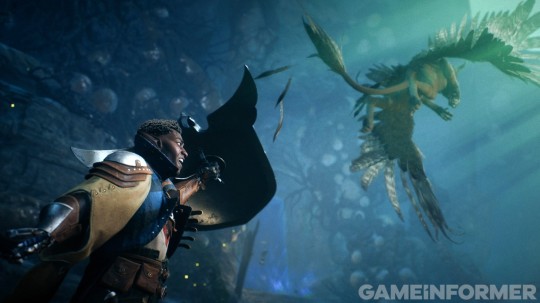
"A Deep Dive Into Dragon Age: The Veilguard’s Combat, Abilities, Skill Tree, And More by Wesley LeBlanc on Jun 18, 2024 at 02:10 PM If you're at all familiar with the Dragon Age series, you likely already know BioWare has experimented quite a lot with its gameplay. From Dragon Age: Origins' real-time strategy RPG approach to Dragon Age II's mostly-set-within-one-city action experience to Dragon Age: Inquisition's strategy-action mix, BioWare hasn't quite defined the franchise's combat. However, a through-line is apparent from Origins to Inquisition: BioWare seemingly wants this franchise to be action but has attempted to shift to that without abandoning its longtime fans. With Dragon Age: The Veilguard, BioWare has completed its transition from strategy to real-time action, but thanks to an optional tactical pause-and-play combat wheel that harkens back to the series' origins, I feel it's found a great (battle)ground for Dragon Age combat. Of course, it's hard to tell how Veilguard's action will hold up over what is sure to be a dozens-of-hours-long RPG, but if what I've seen so far is any indication, the studio is on to something. A Shift In Strategy"
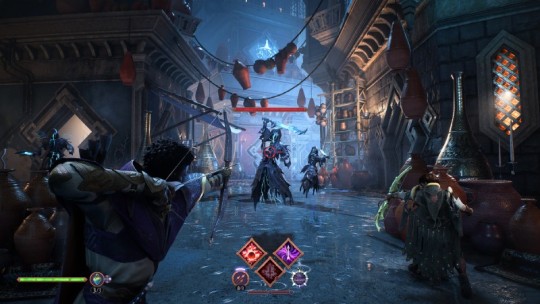
""I think the first thing to keep in mind is that combat [...] in the franchise has been an evolution," game director Corinne Busche tells me within BioWare's Edmonton office. "Every single entry reimagines what combat is like and I would say our goal was to make sure we had a system that allowed players to feel like they actually were able to step into the world of Thedas. They're not a player observing from afar – they are inside of this world. Being this authentic world that's brought to life, the combat system needs to support that, so you are in control of every single action, every block, every dodge, every swing of your sword." Busche says players complete every swing in real-time, with particular attention paid to animation swing-through and canceling. On the topic of canceling, I watch Busche "bookmark" combos with a quick dash. With this mechanic, players can pause a combo's status with a dash to safety and continue the combo where they left off afterward. Alongside the dash, there's a parry for some classes, the ability to charge moves, and a revamped healing system that allows players to quickly use potions by pressing right on the d-pad. Busche says each character will play the same in a way, regardless of class, in that you execute light and heavy attacks with the same buttons, use abilities with the same buttons, and interact with the combo wheel in the same way. During my demo at one point, we use a sword-and-shield Warrior Qunari that hip-fires and aims their shield to throw it like Captain America while hammering down big damage with a sword. Pressing the same buttons as a mage might throw out magical ranged attacks instead of a shield. [embedded link to DA:TV gameplay reveal video] Abilities, like a Spartan-like kick from a Warrior or a Mage's firewall that deals continuous damage, add to the player's repertoire of combat options. Warriors can parry incoming attacks, staggering enemies in the process. Rogues have a larger parry window, and Mages can't parry at all but instead throw up a shield that blocks all incoming damage so long as they have the mana to sustain the shield. "That is just the baseline that allows us to get that level of immersion of, 'I'm actually in this world; I'm a part of it,'" Busche says. "But again, the abilities, the strategy, linking my companions' abilities together to perform devastating combos, that is really where the depth and the complexity comes into play." Abilities And The Skill Tree"

"[caption for image above] Warrior Rook Skill Tree This extends to companions, who, at your choosing, bring three abilities (of their five total) into combat, executed either with quick select buttons or the pause-and-play combat wheel. Every time you rank up a companion's Relationship Level, you unlock a skill point to spend specifically on that companion – this is how you unlock new combat abilities. Though companion skill trees pale in comparison to Rook's expansive tree, which features passive abilities, combat abilities, and more, as well as paths to three unique class specializations, there's still some customization here. You can find the skill tree for Rook and companions within Veilguard's start or pause menu. This menu contains pages for Veilguard's map, journal, character sheets, and a library for lore information, too. Here, you can cross-compare equipment and equip new gear for Rook and companions, build weapon loadouts, and customize your abilities and builds via the aforementioned skill tree, which looks relatively easy to understand."
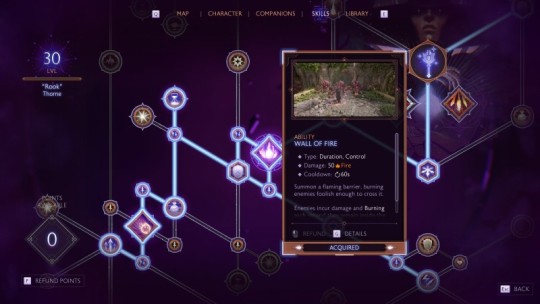
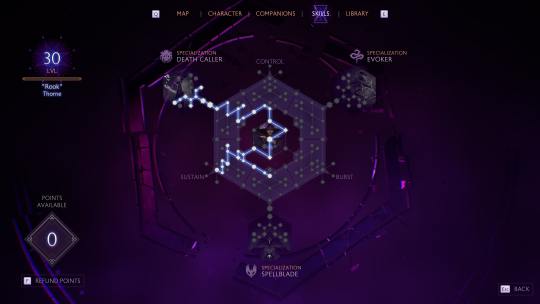
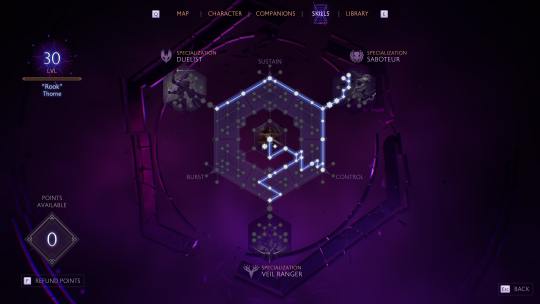
"- Large circle: Class - Diamonds: Abilities - Medium circle: Major Passives and Ability Upgrades - Small hexagon: Traits - Small circle: Minor Passives and Stat Boosts You won't find minutiae here, "just real numbers," Busche says. In other words, a new unlocked trait might increase damage by 25% against armor, but that's as in-depth as the numbers get. Passive abilities unlock jump attacks and guarantee critical hit opportunities, while abilities add moves like firewall and spartan kicks to your arsenal. As you spec out this skill tree, which is 100% bespoke to each class, you'll work closer to unlocking a specialization (which doesn't take reaching the max level of 50). Every class has three specializations, each with a unique ultimate ability. Busche says BioWare's philosophy with the skill tree is "about changing the way you play, not the statistical minutiae." Companions In Combat"
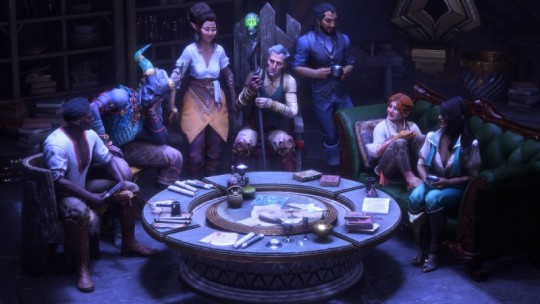
"If you completely ignore companions in combat, they will attack targets, use abilities, and defeat enemies all on their own. "[Companions] are their own people, "Busche says. "They have their own behaviors, they have their own autonomy on the battlefield, they'll pick their own targets. As their plots progress, they'll learn how to use their abilities more competently, and it really feels like you're fighting alongside these realized characters in battle." Speaking to companion synergy, Busche adds, "I see all the abilities Harding has, and I see everything that Bellara is capable of. And sometimes, I'm using vulnerabilities synergistically. Maybe I'm pausing or slowing time with Bellara so that I can unleash devastating attacks with Harding, knocking down the enemy, and then me, as Rook, I'm rushing in and capitalizing on this setup they've created for me. It is a game about creating this organic sense of teamwork." Busche says there are more explicit synergies, with intentional combos where specific companions can play off each other, and you can queue up their abilities to do just that. That’s what the pause-and-play combat wheel is for in Veilguard. In this screen, which pauses the camera and pulls up a flashy combat wheel that highlights you and your companions' skills, you can choose abilities, queue them up, and strategize with synergies and combos the game recognizes, all while targeting specific enemies. Select what you want and release the wheel to watch your selections play out. Putting It All Together"
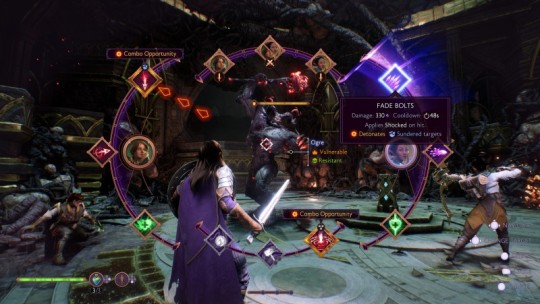
During a mission within Arlathan Forest after Veilguard's prologue, Busche utilizes Veilguard's dual-loadout mechanic. As Rook, you can create two weapon loadouts for quick switch-ups mid-combat. As a mage Rook, she uses magical attacks to add three stacks of arcane build-up to make an Arcane Bomb on a Sentinel, a mechanical set of armor possessed by a demon. If you hit the Sentinel's Arcane Bomb with a heavy attack, the enemy will take devastating damage. Once the Sentinel has an Arcane Bomb on it, Busche begins charging a heavy attack on her magical staff, then switches to magical daggers in Rook's second loadout, accessed with a quick tap of down on the d-pad to unleash some quick light attacks, then back to the staff to finish charging its attack. She then unleashes the heavy attack, and the Arcane Bomb explodes in a liquidy whirl of green magic. "I've seen [Veilguard's combat] refined over time [and] I love it," BioWare general manager Gary McKay tells me. "I love that balance of real-time fluid action, but also the ability to have the depth in the RPG, not just in terms of pause-and-play, but the depth in terms of how you bring your companions into the battlefield. What are you going to do with their skill points? What's the loadout you're going to use? Everything is about bringing Rook to the center of the battlefield, and I love it." Former Dragon Age executive producer and Veilguard consultant Mark Darrah feels Veilguard is the first game where the combat is legitimately fun. "What I see in Veilguard is a game that finally bridges the gap," he says. "Uncharitably, previous Dragon Age games got to the realm of 'combat wasn't too bad.' In this game, the combat's actually fun, but it does keep that thread that's always been there. You have the focus on Rook, on your character, but still have that control and character coming into the combat experience from the other people in your party." I get the sense from watching Busche play several hours of Veilguard that BioWare has designed a combat system that relies heavily on players extracting what they want out of it. If you want to button mash and use abilities freely when their cooldowns expire, you can probably progress fine (although on the game's easier difficulties). But if you want to strategize your combos, take advantage of elemental vulnerabilities, and min-max companions and Rook loadouts, you can do that, too, and I think you'll find Veilguard rewards that with a more enriching experience. For more about the game, including exclusive details, interviews, video features, and more, click the Dragon Age: The Veilguard hub button below."
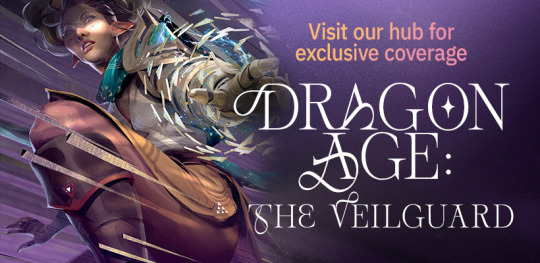
[source]
#dragon age: the veilguard#dragon age: dreadwolf#dragon age 4#the dread wolf rises#da4#dragon age#bioware#video games#long post#longpost
112 notes
·
View notes
Text
assorted TTRPG things
nugget from the tab bonfire: at some point I was reading about RPGs. some things that are old, some are new(ish). here are some links, since I think they are interesting, and some additional comments.
first-up: my own RPG posts are now archived here. that section of my site is looking a whole lot more fleshed out now.
1. ritual
in 2021, Meguey Baker wrote this one about 'ritual in game design', fitting TTRPGs into her frame of faciliating rituals for essentially therapeutic purposes, aimed at parents. since I like talking in a vaguely (vaguely) anthropological way about the analogies between TTRPGs and other activities (improv comedy, kink, wrestling), this is very relevant.
by Meguey's definition, a ritual is defined through this series of words: intentional contained conscious creative action. of course, she gives these words fairly specialised definitions. she's mostly interested in addressing TTRPGs that go into tough, bleedy places, described in books like Alice Is Missing, BFF, and Bluebeard’s Bride - of these I'm only familiar with the third but I'm kind of aware of the genre of game she's talking about. she suggests that these principles don't really apply if you're just playing to hang out and have a good time, but to my mind, just because you're less formal about it doesn't mean that's not an aspect of ritual, and the analysis is similarly applicable there, just lower-stakes.
in fact I think a whole lot of human activities are rituals (classic bryn move to grab a conceptual hammer and start seeing nails everywhere). the analogy goes the other way too, rituals are kind of like games.
I'm not entirely convinced the breakdown into jargon words really does a lot for me, but the crucial thing here is the sort of entering and exiting into a constrained social space which has its special set of rules. meguey writes these cool little coloured lists which depict the various stages of getting you into a game/ritual headspace and exiting it afterwards...



...and specialises it to the case of roleplaying games as you see. it's pretty BDSM-like isn't it? sure, that's something I'm currently interested in, I recently read The New [Topping/Bottoming] Books, but it certainly does suggest that analogy strongly for me; I think a general recognition that RPGs should have aftercare would do a lot more for the scene than a lot of the other 'safety tools' like X-cards and so on. (a weaker analogy is the principles of animation: anticipation, action, follow-through.)
this idea of ritual also strongly parallels the definition of 'play' of roger callilois:
1. it is free, or not obligatory 2. it is separate from the routine of life, occupying its own time and space 3. it is uncertain, so that the results of play cannot be pre-determined and the player's initiative is involved 4. it is unproductive in that it creates no wealth, and ends as it begins economically speaking 5. it is governed by rules that suspend ordinary laws and behaviours and that must be followed by players 6. it involves make-believe that may be set against 'real life'.[6]: 100–101
as a set of traits which describe a somewhat fuzzy sphere of activity. meguey's account of 'ritual' focuses more on the set of steps you follow to enter and leave the ritual space, but it is describing, I think, a heavily overlapping 'thing'.
why so explicitly break down a process that most people seem to come by naturally? well, probably for the same reason that kink people do it: the more you play with [emotional] fire, the more care you must exercise to keep it contained. but it is also pretty important, I think, to pursue some degree of ritual for the middle part to actually work. you need to switch mental gears first to get yourself operating in 'game space'. same goes for a number of other 'spaces' for that matter. in RPGs we already have plenty of rituals: getting set up around the table (for offline games), general chitchat beforehand to get us feeling social with the other players, the brief summary of the previous session to mark the transition into RPG mode...
one non-obvious extension that Meguey makes, in the third excerpt above is to the actual text of RPG books, in terms of how they are presented to the reader. I think this is genuinely quite an insight - when you read a book you get into RPG space a bit and imagine playing the game, building up the fantasy of what playing it will entail (c.f. what's the book for, part 3).
though, that said - it is tricky to pursue a strict ritual structure in presentation, I think, because I think RPG books tend to be read very non-linearly. only quite short games tend to get read cover-to-cover in one sitting. otherwise you tend to skip to the part that you need. still: the manner of presentation is very important to an RPG book serving its purposes. and this is a fascinating frame for it.
I'm not sure this essay necessarily gives a new direction (as a designer or a player), but it does give an interesting angle to understand things I was already doing previously, and do them a little more deliberately.
for example, when I make a point of mentioning moments that I enjoyed in the time after an RPG session before we all part ways, that is the 'return/celebration' part of the ritual, and crucially it reassures everyone that even if they were playing an unpleasant character or there was inter-character conflict in the session, it was something I was looking for and appreciated. I do this because there have been times when I've felt a bad kind of bleed, fearing that my character was 'too much' and was detracting from the session, or that a conflict in-character reflected an OOC conflict. having an explicit affirmation helps drive away those fears.
2. rule zero in D&D
this history of 'rule zero' in D&D editions dates all the way back to 2012 (although it seems to have been updated since), but it's still very relevant to my current efforts to understand RPGs, books, and all the weird practices around them, the role of 'rulings' in OSR, etc etc.
right off the bat, I appreciate the nuances that this early paragraph expresses:
The attitude towards rulings vs. rules in the game shows up - directly and explicitly in the rules text - implicitly in the text and detectable via textual analysis - in the surrounding publications considered semi-canonical (Dragon magazine, nowadays forums and designer blogs), and - the culture of gamers surrounding it.
while the rest of the post is still focused on what books say rather than what people did with those books, it's a relief when people note that there is a difference.
so, the essay traces a general evolution of ideas about what role the rules in the book are supposed to follow as D&D moved away from wargaming and passed through the hands of different publishers. how much interpolation and discretion the DM is supposed to apply to the text, how authoritative they're supposed to be at their own table compared to the non-DM players...
it's fascinating to observe how the culture of the game evolved. it's also tricky to distil the different currents down into a brief summary - I tried and realised I was just recapping the article in less detail. luckily the author wrote a summary so I can just quote that:
0e – the referee is an aribiter and fills in the gaps 1e – the DM is large and in charge, the rules are pretty good, your players are at both’s behest B/X and 2e – the DM and players are both important, the rules are super mutable 3e/early 3.5e – the rules and players and DM are leveled out in importance, meaning rulings are minimized and a negotiation with players BECMI/late 3.5e/4e – the rules are pretty fixed and players and DM are equal and subject to the rules as law; RAW is an option OSR and Pathfinder – splitting off in their own directions in reaction to 4e, OSR back to a mix of 0e and B/X flavored attitudes and Pathfinder to a hybrid of 1e/2e/3e attitudes 5e – The DM is clearly in charge and can ignore/change rules and rolls as they deem wise, with the goal of everyone having fun (as opposed to the sometimes-stated 1e goal of “keeping the players in their place”.) It reincorporated a lot of the 1e and 2e thinking into the game to an even greater degree than Pathfinder. PF2e – Effectively back to 3e positioning fairly exactly. It stepped back away from where PF1e and 5e were going and got a little less enthusiastic about GM authority, carefully scoping it to interpretation and, sometimes, changes to make things fun. Maybe a *little* more towards 5e than 3e was, but only by a hair.
anyway, there are a couple of interesting points I want to pull out of the discussion. first is this insightful comment on the broader implications of rules that grant abilities - something to discuss further in a later post...
The problem with [D&D 3.5e's claim that you can try anything and the rules only govern chances of success] from a textual interpretation standpoint is that it’s hard to not interpret the raft of “possibility” options in the 3e branch of D&D as being restriction of options. I can try to throw my opponent in a grapple – until a feat comes out that says “In a grapple, you can now throw your opponent.” Thus despite mitigating statements by the designers, their design itself passively promulgates an approach to the rules as written.
there's also an interesting line about how 'old school' the OSR actually is, answer being that it's complicated.
Some, however, consider this to be a bit of a retcon of how old school gaming actually worked. As you can see from this research, it is and it isn’t – the “rulings vs. rules” concept was very strong especially in B/X and 2e, somewhat less so in 0e/1e, and actively militated against in BECMI. Hackmaster and the Knights of the Dinner Table comic prominently parody the not uncommon rules-adherence mode of play in AD&D. As all nostalgia does, the Quick Primer picks certain elements out of the past to bring back and leaves aside some other elements.
finally, we have this comment about the (then very new) 5th edition approach to framing its rules:
It also appears to take a hint from the OSR’s formulation of “rulings, not rules” as well as the prominent fiction-first modern indie games like Apocalypse World when it describes the basic pattern of play – 1. The DM describes the environment 2. The players describe what they want to do (and the DM decides how to resolve those actions – importantly, the PCs don’t decide what rules they use) 3. The DM narrates the results
...which is somewhat true to my experience of 5e, although I think there is still a fairly significant component of 'I use this ability on my character sheet' in the game (I use this weapon, I cast this spell, I use this special ability). So the players do often decide what rules they want to invoke. Although, that is also true of Apocalypse World - something to go into another day.
mostly I think it's really helpful to have a proper sense of the space of practices represented by D&D, since popular discourse (including the game's rulebooks) way too often seems to assume there is only one way that D&D is played. this is a good stab at exploring some of the dimensions, and will definitely inform whatever is the next investigation I make into the structure of RPGs.
for another angle on D&D history, I came across this old (2016) ENWorld post tracing how Gygax got increasingly proprietary and litigious with D&D, and hostile to people putting their own spins on it.
it seems like for more on this topic of early RPG history I should be taking a look at The Elusive Shift by John Peterson, so posssibly more to come on this subject when I get round to reading that one.
3. blorb
I came across Sandra Snan's website, idiomdrottning.org, which is another one of those classic static-site treasure troves of someone's thoughts on everything for like the last decade.
like me, she came back to playing trad games like D&D after spending a while exploring the storygames milieu. She landed on a set of practices relating to the concreteness of the setting, in explicit opposition to 'no myth'-style games where anything not stated out loud is fair game to be modified for the sake of narrative.
she calls this 'blorb', and as these things tend to, it gets something like a manifesto. many other articles on this site talk about various facets of roleplaying games are written about on the site in relation to this.
'blorb' focuses on the relationship between preparation and improvisation: making a big show of referring to things on paper, and making decisions in the open, to reinforce the sort of metanarrative that there is an underlying reality even if it hasn't fully been discovered yet. it emphasises more granular simulation over abstraction.
since it's a little hard to navigate Sandra's archives, I've gathered the posts that are relevant to the subject here:
the chasm width problem (motivating, raising the issue that few games explicitly address the how of DMing)
blorb principles
realism and blorb (which discusses the other name 'klokkverk' used elsewhere in the milieu, and compares it to 'no myth') + the fictioneers talk about blorb again
radically transparent DM-ing
say the DC
antiblorb
GM-less roleplaying games
a blorb thought
the quest queue
there's probably others but these are the main ones I read
for contrast, no myth, a somewhat overlapping and somewhat very different paradigm of games that broadly sums up the norms of the Forge/'story games' tradition.
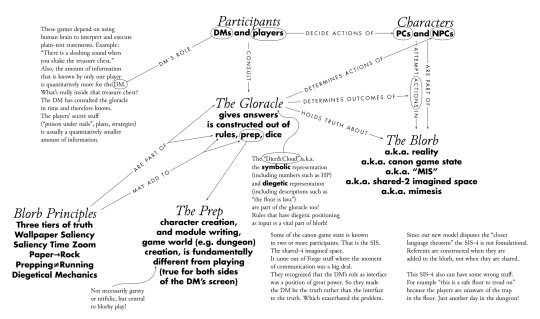
to sandra, 'blorb' is a statement of the type of roleplaying she finds vastly more satisfying to operate, and the crucial elements to make that happen.
what I find interesting about blorb is that, since its main interlocutor is the Forge/story-games tradition, it puts a fair bit of discussion into how this affects the fiction in practice. e.g. what you should prepare and what you can still improvise, and how the existence of the 'gloracle' (the combination of prepped materials and dice/rules, and rigour in consulting them) shapes our notion of 'the fiction'.
via this post, vincent baker back in 2012 defined RPGs thus:
To me, the crucial feature that makes a game an RPG is that it works by the (so-called) lumpley primple: in order to play, we have to create fictional stuff and agree that, for gameplay purposes, it's true. This is a pretty technical and inclusive definition. It includes Once Upon a Time and that game where you sit in a circle and pretend that some of you are werewolves, for instance.
something I find very interesting RPGs is the process of 'synchronisation' of the shared fiction. the idea of 'shared fiction' is something of an elaborate illusion. every player has a different version of it, with different emphases, different things that are fresh in memory, different interpretations of the images...
consider verbal descriptions of locations. my sense of what is in a scene will constantly be adjusted based on the stream of description I'm receiving from other players - the 'shared fiction' is at best something we approach asymptotically.
in an extreme example, a DM could lead with an elaborate description of the architecture, decorations, and layout of the room, before wrapping up with 'and curled around the central pillar is a mighty red dragon'. dun dun dun! suddenly, I have to recontextualise everything in the scene I was building in my head to accomodate the presence of the dragon.
the unreliability of this communications channel was a source for a vein of classic D&D humour, such as the Dread Gazebo of yore, where the communication channel breaks down leading to an inconsistency in the 'shared' fiction.
'no myth' and similar ideas come from the recognition that, until something is said out loud and enters part of the shared fiction, it can be changed freely between any possibility consistent with the 'established' facts. sort of like the wave function collapse algorithm. they take the attitude that you should do this deliberately to maximise drama and add complications, taking on more of a writer/director role. this character enters a bar, what should they encounter there? it would be fucked up if they encountered their ex, right? ergo their ex is there.
there is a degree of this in every RPG, not just your high-improv post-Forge story games. in order for some sort of consensus to be reached, parts of it must be black-boxed and unpredictable. for example, if I am inhabiting a character, I have my idea of how they will act and what they're feeling and thinking about, and that's authoritative. but that means for everyone else's characters, I have my impressions and predictions, but they're subject to being updated as soon as that player speaks.
for Sandra, this recognition that everything is getting moved around for drama undermines the substance of the world - an inescapable awareness even if the players take pains to make the established, spoken-out-loud fiction consistent.
so, additional 'authority' is central to the 'blorb' playstyle. that is, in addition to each player's authority to make up stuff within their domain (e.g. what their character does), you make a big point of deferring to some additional authorities such as pre-prepped material and dice (which Sandra calls the 'gloracle'), and making it explicit to the players that you're doing so. for example, you might talk about the random encounter tables you're using and what would change their contents, or declare the DC before every roll.
it's kind of a defensive style of DMing, in that it's entirely designed to forestall any suspicion of 'fudging' behind the scenes. the tradeoff is: more explicit discussion of game mechanics which might detract from the sort of 'atmosphere', but equally a stronger sense of inhabiting an external world where things are 'really' happening 'offscreen'.
to me, the idea of 'fudging' doesn't bother me nearly as much as it seems to bother Sandra, but I think there is some truth to the thought that if everything is subject to random tables or pure off-the-dome improv, the game can start to feel a very homogeneous. as Sandra puts it in one of her articles:
I don’t want to expand randomly as we go either, because if everything is randomly rolled as you go along, where’s the agency? South becomes the same as north becomes the same as west because wherever you go, the dice are furnishing for you, so the choice about where to go matters less.
it's probably got something to do with information theory, right? once you become familiar with the table, and you know when the table will be invoked, you've broadly found out what there is to know about that thing. there are only so many bits of information.
I was saying the other day, games are interesting because they are something to explore through interacting with them to discover all their weird nuances. players are pretty good at sniffing out how complex and varied the underlying system is. a wide set of interesting, spicy locations - and logical relations between them - has more nuances to discover than a random table with, say, 10 entries.
the problem is of course that such a prep-focused playstyle can lead to huge amounts of 'wasted' effort fleshing out elements of the gloracle which may never be activated, especially if players don't spend their time rubbing against your creation in various ways to discover its nuances. Sandra's approach is to work out what's easy to improvise on the fly (the 'wallpaper') and what is crucial to pin down in advance, and largely prepare the latter - the difference, I guess, coming down to experience. we can think of it in programming terms: a small authoritative state and things that can be derived from that.
in my experience, at least some players have become a lot more considerate of the workload of GMing. far from trying to resist 'railroading', they will often generally deliberately try to steer themselves towards whatever location a DM has prepared as a courtesy; meanwhile the GM will be able to get a sense of where the players are planning to go so they can prep between sessions. however, that is contrary to the more 'sandboxy' approach where the core appeal is 'you can do pretty much anything', which is what Sandra is trying to generate I think.
I'm too much of an improv-focused GM to really become a partisan of 'blorb' - for me, discovering improv-oriented story games after D&D was as revelatory as discovering D&D after storygames was for Sandra lol. I trust somewhat in my ability to come up with weird interesting stuff on the fly and flesh it out later, and I tend to find the moment of being in the hotseat of an RPG gets the creative juices flowing like nothing else, so it's actually quite difficult to come up with anything good during prep.
however, I think there is a lot to be said for the value of making at least certain things concrete, and communicating that to the players, and Sandra makes a good case for showing your hand. it's a way to make the shared fantasy take on certain qualities it won't have if it remains purely arbitrary improv, even if the only real functional difference is when you make something up. both because it's hard to keep track of everything in your head without some kind of aid, and because the first idea you come up with will rarely be the richest, most interesting.
so next time i run a game, I'm not going to take such a zero-prep, all-improv approach, but try and work a bit harder on 'overall consistency'.
definitely a provocative blog to encounter...
46 notes
·
View notes
Text
Close to a year and four rewrites later, I present to you...
Stem's Thoughts on the Game Design of Harvest Moon on SNES
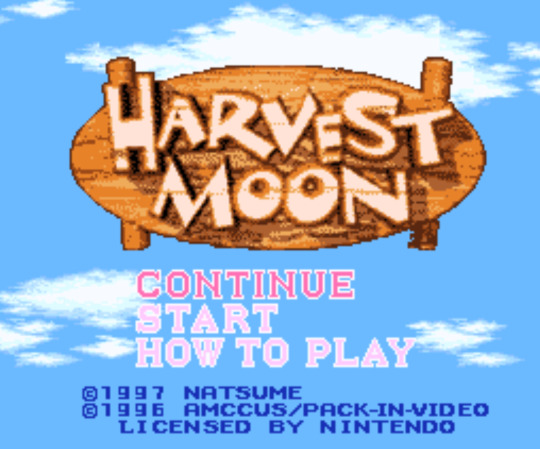
I’m not going to lie, if you don’t like farming sims, you won’t like this one. At their core, every farming sim (at least in the rpg genre) is nearly identical, and that’s because of this game. In a way, I might dare to say that Harvest Moon for the SNES is the perfect farming sim because it has every one of the usual elements in their most simplified form and it just works straight from the get-go. It works so well in fact, that after this game came out in 1996, four more entries to the series were released before the year 2000.
If you are someone who does like farming sims, I can’t recommend this game enough. It’s simple and to the point, with a fast pace and enough random events and points of intrigue that the game kept me relatively engaged for my whole playthrough.
Also, by nature of this being the first game and therefore hard to cover concisely and by nature of taking so long to write this... it's long as hell! Enjoy! :) <3
I can’t say my appreciation of this game doesn’t come with a few caveats. I’ve intermittently played HM games all my life, starting with the GameBoy port (GB1) all the way to Pioneers of Olive Town, so while I don’t know exactly how the series has evolved, I’ve seen it at some of its earliest and at its latest. My vague childhood memories of GB1 (a game I didn’t own and didn’t play much of) were that it was pretty sparse and bland, so knowing that this original game was allegedly the same thing but with a little more content, I was expecting the bare minimum. I was prepared to never even be able to leave my farm, but the first thing the game did was shuttle me off to the nearby town and blocked the exit until I talked to everyone there.

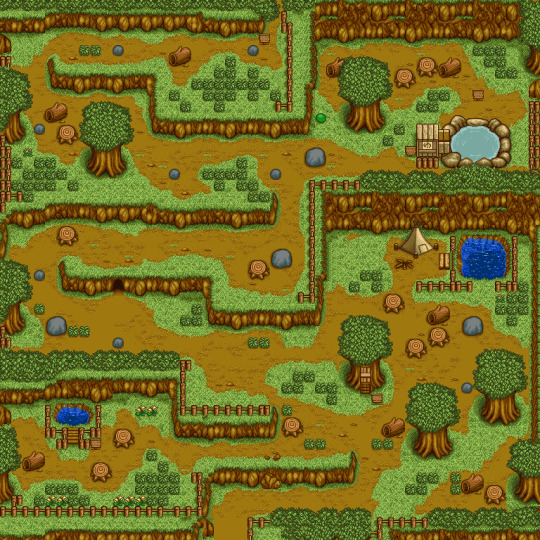

(Maps of the town, mountain, and farm via The Spriters Resource)
You learn everything you need to know about the game right here at the beginning; Firstly, that this town is small as all hell and has hardly anyone in it aside from the five girls you can marry and their immediate family members. The next thing you’ll learn is that there’s a fence on your farm, and you need to be taking care of that. Of the few repetitive lines of dialogue any given person in town has to share with you on any given day, a fair amount are devoted to reminding you to fix your fence, to make sure it’s in good repair. There was just a big storm so watch out! Remember to check it every day! Are you chopping enough wood? Because you’ll need it for that fence!
I’m being dramatic of course, you aren’t reminded about it that much, though the thin variation of dialogue means it comes up a lot. The emphasis on your fence does exist, and it isn’t for nothing: while it doesn’t matter as much if all you do is grow crops– if you keep animals, the game tells you that the ideal thing to do for yours and the animal’s happiness is to put the animals outside to graze. Animal feed bought from the livestock shop will keep them fed, but it's nothing compared to fresh grass grown on your farm. You can’t even buy animals without a certain amount of grass planted! And sure, you can cut the grass to store for later, but it’s at its best straight out of the ground. However, the way the game is programmed, the animals only eat when the day rolls over, so putting animals outside for the day and taking them in at night isn’t an option, and on top of that, there’s things that come out at night that can hurt your animals. This is where your fence comes in.
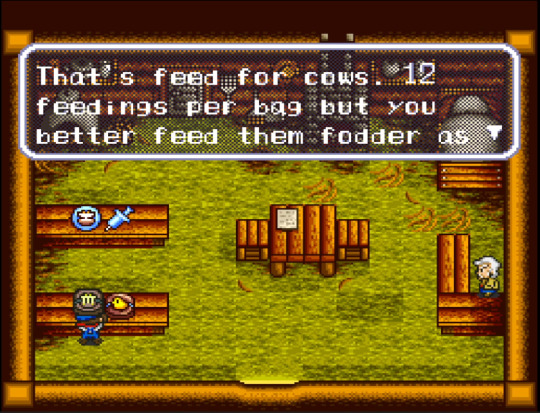
The Utility of Fences
At the entrance to your farm is a cluster of buildings: your house, a small lumber shed, a barn, coop, and silo, a tool shed, and an old, dried up well. Just barely surrounding all of these is a little wooden fence that looks more like a row of upright logs than anything else. Despite this farm having presumably been abandoned, the fence is in perfect repair. You’ll quickly discover that the fence as it is won’t work out; there’s hardly space to plant anything within it, and with the well dried up, you’re forced to hop it to get to a water source to fill up your watering can. It’s pretty clear that you’ll need to expand your fence, and it’s easy to do with all of the tree stumps littering the massive field that it’s blocking off.
On top of needing to expand the range of your fence, the individual planks eventually will rot away and leave useless stumps. They show up more frequently after rain or a large storm. The posts don’t rot away completely so they have to be manually removed, but replacing them is as simple as smashing the old post with a hammer or ax and popping a new post in its place. It becomes a very natural part of your daily routine to run a lap around the farm’s perimeter before you go to bed to make sure everything looks safe and secure. It’s a good way to ensure your animals are put away and debris is cleared out, too! It slotted very nicely into my daily schedule until a certain point.
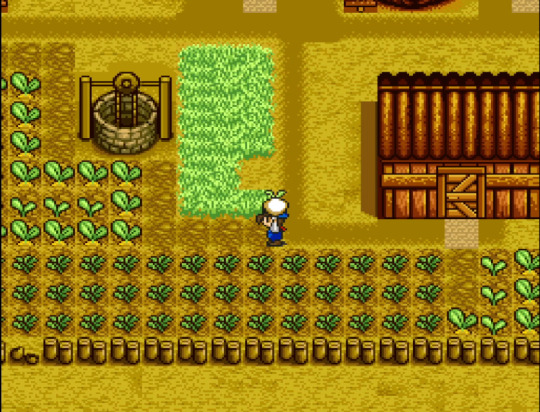
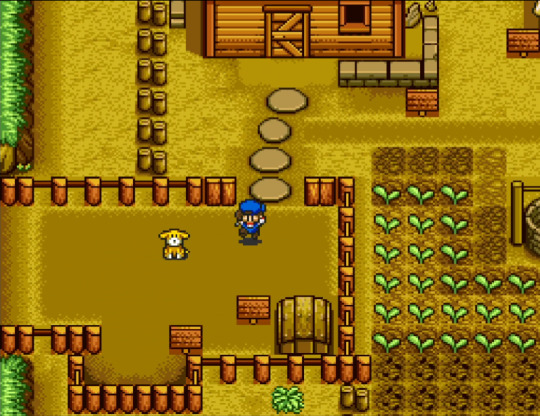
With how much time you have to spend hopping over the logs to get to the rest of the area too large to fence in, you might be tempted to leave one out of place for easier traversal. When night comes, it’s clear why that would be a mistake. Sometimes when you go to bed, you’ll hear your dog barking. It’s a small detail, one that took me a long time to notice because I didn’t always play with the sound on. There are wild dogs that prowl around the wilderness surrounding your farm, and only at night do they dare to come close. Your dog, if left outside, isn't able to do anything other than warn you of their presence if they show up. There’s nothing to notice during the daytime if it happens, unless you happened to leave one of your animals outside. There was one night that I left my chickens outside, having thought my fence was in perfect order and repair. I went to bed and heard the dog barking, followed by a horrible crunch. When I went out in the morning, I saw where my chicken had been before, it had been replaced by a pile of feathers. On the north side of my farm was a rotted fence post I’d failed to fix.
The Reality of Fences
After losing my chicken, a cluster of pixels on my screen it may have been, I didn’t feel comfortable leaving my animals outside. I didn’t want to take a risk again, the sound and sight of feathers was upsetting enough. On a more logical note, the chickens didn’t even lay eggs if left outside so there was no value in it. Cows were a pain to put back inside the barn too, because of some silliness with the game’s collision. As much of a disappointment as it was to not have my animals roam around, it was just easier. At the time, I was focusing on upgrading my house anyways, so I didn’t have time to take care of my animals outside where time would pass when I could use that time gathering wood, and everything I had was being saved up for the house so I didn’t have any extra materials to repair my fence with. My fence was all rotting away. Because it was inconvenient for getting to my crops, I started smashing all the old posts as they went, too. That’s when I noticed something: the wild dog wasn’t coming anymore.
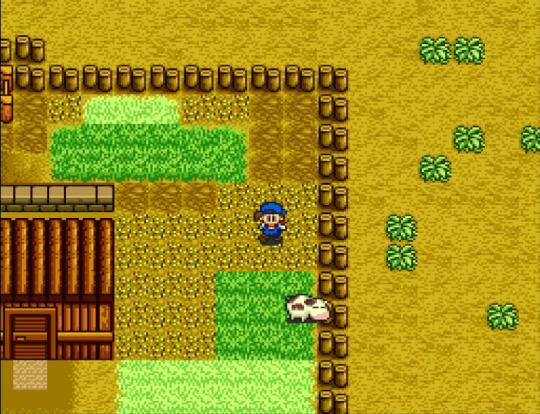
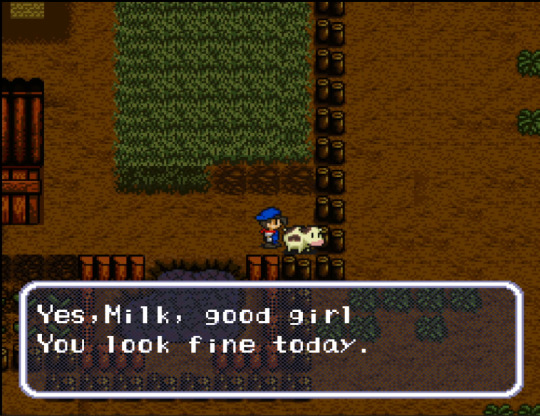
I didn’t pay much attention to it until I was looking up a completely different mechanic and discovered a forum explaining how the fences were broken. Rotted posts attracted the wild dog, they said. It didn’t matter if you had gaps in your fence, or even a fence at all–in fact no fence was the best kind to have because the mere existence of posts that could rot was a liability.
I was hesitant at first to test this concept, after all there wasn’t much I could gain from it. My chickens wouldn’t lay outside, and my cows would be too challenging to get back in if the forecast called for rain. The thing that got me to finally try it was when I was trying to hatch more chickens. My coop felt like a nightmare to navigate due to its current population. I wanted less animals inside that I had to feed, so I threw a couple chicks outside–they weren’t laying yet anyways. Lo and behold, the dog didn’t come. More days passed and more animals were left outside, and it never came. My fence had rotted until there was nothing left at all. No dogs could ever come to my farm again. And I realized that the game’s own insistence on its mechanics was all a lie.
How You’re Told To Play - How The Game Lies
Of course, my animals didn’t stay outside. For a minute it was fun having a crowd of cows milling about while I tended to my crops, but letting them wander free and uninhibited made it impossible to find and milk all of them without any trouble, and there were the rainy days to watch out for. After the novelty wore off, they went back inside and stayed there. The thing is, that didn’t make a single bit of difference in how much they liked me compared to how they were living in the barn. On top of that, they didn’t seem to care whether I was feeding them grass or store-bought food either, though I mostly stuck to the grasses since they were cheaper and easier to get. Nothing about how I was told to care for animals really mattered past feeding them every day, petting it and maybe brushing it, if it was a cow.
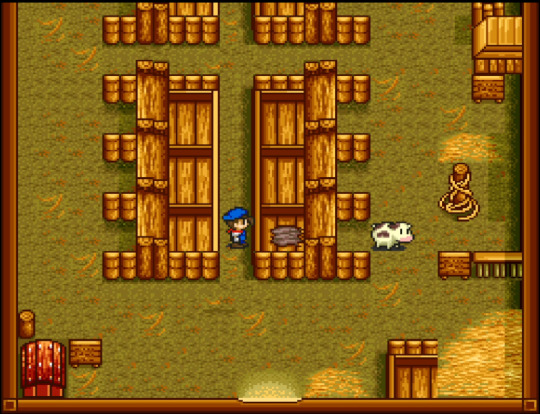

It gets worse. The most basic aspect of the game is the fact that time passes. The story takes place over 2 and a half years, running through each day until the end, and these days last from 6AM to 6PM according to the game’s own internal time setting. After 6PM, all of the shops aside from the bar will close and you lose the ability to sell anything as you’re told it would rot in the shipping bin overnight, so there’s nothing to do but sleep until the next day. Issue with this is that when the days stop at 6PM… they just stop. Time doesn’t flow anymore. The game doesn’t give you any kind of clock to know the exact time it is until after you’ve upgraded your house, so all you have to go by before that is the color of the environment and whether or not your character has played an animation to eat something (you’re automatically fed when you wake up, at noon, and at night). I discovered this because I was curious if I could actually see the wild dog by staying out, and left the game running for probably 20 minutes in real life only for nothing to happen. Because of the time freeze, the time after 6PM actually becomes really valuable for farm logistics. You can’t sell anything, no, but you can pull up all the weeds on the farm, water your crops, fix your fences, feed and care for animals if you hadn’t already, and harvest wood for fences and house upgrades which would have taken a lot of valuable time to get during shipping-hours. The only thing that gets in the way of doing all that is you running out of energy.
Your energy is what allows you to use your farming equipment like your ax or watering can. Running out of it doesn’t mean you fall unconscious or anything, but your character will play an animation of them stumbling over and will fail to use any tools. The most obvious fix to this is to simply go to bed, as sleeping gives you a full recharge. You can also, however, recharge it by going to the hot spring on the mountain, or by eating food bought at the restaurant in town or foraged for in the forest. You can’t tell easily how much is refilled, as there’s no visual indicator like a health bar, but you’re able to eat more than once, and jumping into the hot spring seems to count whether you did it or not more than how much time you spend in there, so you can hop in and out a couple of times and call it good.

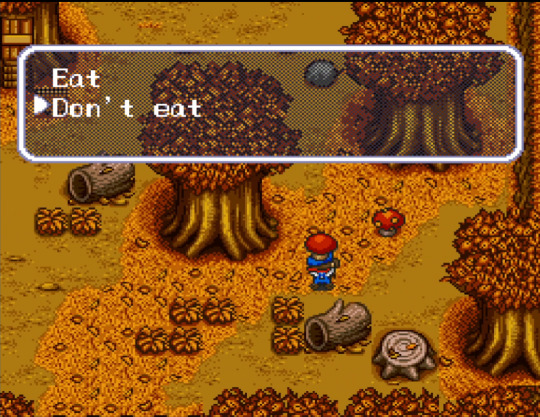
Individually, time freezing at 6PM and energy being endlessly replenishable aren’t bad things. Even together, they’re not the worst. Having free time to focus on profitless chores is nice, and I think it’s important to be able to replenish your energy in case you have a limited amount of time to do things like for example, cut all of your grass before winter kills it. What makes an exploit out of these is the fact that the resources in the forest will never run out. Every time you re-enter the forest, all forage items and tree stumps are respawned. The infinite amount of forage makes for infinite energy refills, and could also make for an incredible money exploit if you didn’t have a very limited amount of time to ship things. You don’t have a limited amount of time to cut up tree stumps though. If you wanted to, you could run up to the forest after 6PM, chop every stump, then simply reload the area, and everything’s back. You can get all of the wood you would ever need to fully upgrade your house in one night. It’s a bit of a grind to do all at once, but it’s a grind you’d be doing over time anyways. It’s not the worst exploit in the world, since you still need money to pay for the house upgrade, but arguably because of how you have to focus your energy elsewhere for most of the game, the wood is the harder thing to get. Additionally, when the game has very little to do in both fall and winter due to the lack of crops, this exploit takes away just about any reason to play those two seasons other than to take care of animals. It’s an optional exploit of course–as all exploits are–but once you learn about it, it’s hard to resist the desire to get the grind out of the way all at once and mess up the pacing of the game.
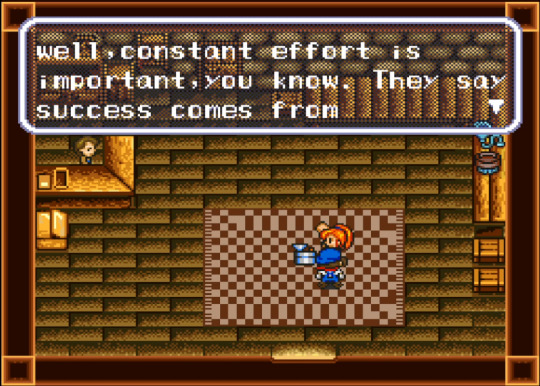
The Charm of the Game
Learning that the fences were completely broken as a mechanic was a huge disappointment for me. From the moment I got a grasp on how the game was supposed to work, I wanted to eventually surround my whole field with fencing and keep my animals outside so I would have some life on my farm while I worked. I didn’t just want this, I was excited for it! This was something I’d never done in a farming sim that didn’t already manage putting animals in and out for you like Stardew Valley or newer Story of Seasons games do. My routine is always the same: I go into the barn and coop to tend to each of my animals, I take care of my crops outside, then run straight to town to talk to everyone, and go to bed. The change in routine that would come from taking care of the animals outside and patrolling the fence every night felt fresh to me. It made me feel that even though this was the first game of its kind, it was different and required new things of me. But in the end, I played it exactly the same.
Harvest Moon is still very different from all of the games that followed it, though. In many ways, it’s because it has less “stuff” in it– both in terms of items and things you have to do. But I wouldn’t say that it feels incomplete. Harvest Moon runs over the course of 2 and a half years before your work is evaluated. Until that happens, you have the ability to farm four different crops, you can raise both cows and chickens, you can upgrade your house to have more features, upgrade your working tools, build relationships with the townspeople to a small extent, go to town festivals that happen each year, and you can get married to one of the five girls living in town with whom you can have up to two children. Everything that you would come to expect as a fan of games like this is already here from the very first iteration. The most notable lack this game has, and one that seems to be completely unique to this game, is that there aren’t any crops in the fall or winter, which means that unless you have animals, there’s a whole half of the year that you don’t have anything to do. The game is clearly aware of this though, because in an average playthrough, this is where you’ll start to run into the story events.



There isn’t much of an overarching story in the game, past the general concept that you’ve run away from home to work on an abandoned farm. The conclusion rests on how good of a job you actually do. In between those two points are smaller events, usually tied to when you get tool upgrades or special ones for each of the romantic interests. The first event you’re likely to run into happens on the very last day of summer, where one of the woodsmen comes to your house in the morning to ask if you’re okay because he heard a huge crash at night and you should check your farm. What I found was that a tree in my field had fallen over, and its remaining stump had a big empty hole in it. When I inspected the stump, I was suddenly underground in a cave filled with loud and industrious music, and I was faced with two, little green people–Harvest Sprites, though I don’t know if they’re called that yet here. One asked me if my scythe worked well, and when I said yes, told me that they had made it and that I should check my shed tomorrow for a better one. Other tool upgrades are obtained in similar fashion; one comes from feeding a starving sprite a mushroom and another comes from another hole in the farm opening up to reveal another part of the cave system that has a couple of hints on how to unlock other things.
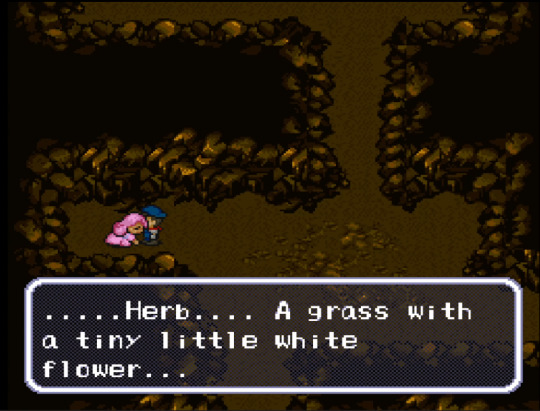

The events for romantic interests happen at less scripted times, as they’re tied to how strong your relationship is with each girl. Each girl only has one event, and it only triggers when your relationship is high enough that you would ask her to marry you. The events usually take up a whole day, and don’t necessarily add much to each character. Ellen’s revolves around how she’s no good at keeping pets– something established on your second day at the farm when you get your dog from her, Eve’s hammers in her fraught relationship with her grandpa, and Ann’s is about losing the chicken weathervane, or “weathercock” which sits on the roof of her workshop and goes missing every time there’s a storm. Conversely, Nina and Maria’s scenes bring up entirely new events that bring up a number of questions while providing no answers. Nina disappears while looking for a medicinal plant because her mother is apparently sick, and Maria vanishes for days until you find her hiding away with the woodsmen for some reason. All of these events, whether they share new information or not, manage to add some greatly appreciated depth to each character by giving them more room to speak and be sincere than their short and repetitive day-to-day dialogues do.


The dialogue in this game is simple, to the point, and sparse– probably because there was only so much memory that could be reserved for approximately 15 people who all have multiple lines of dialogue, and only so much money to pay someone to write more. There is simple dialogue that doesn’t tell you much more than “hello, how are you” would, more dialogue that I’d label as tutorial text, and a few lines that I truthfully couldn’t understand well because of the sub-par translation this game received for english. The dialogue that exists to inform the world really manages to create a unique vibe though. Nina’s dialogue, almost always about plants, goes into forays about how they’re creatures with wills to live, too. Ellen’s uncle who runs the ranch shop tells you that it’s much better to feed your animals fresh grass if you try to buy any from his store, and if you decline to purchase he laughs as if he’s won something. There’s even dialogue referencing the silent player! Multiple lines exist to comment on him not paying attention, and inspection prompts have people telling you not to touch something rather than being an item description. It was the last thing I expected, to get the same level of personality out of the main character as I did from each of the girls, albeit very subtly. He went from a kind of nothing, self-insert into being what I perceive to be a hyperactive boy, akin to a border collie who was let out into a field of sheep for the first time–the exact kind of person crazy enough to take on an abandoned farm and succeed.

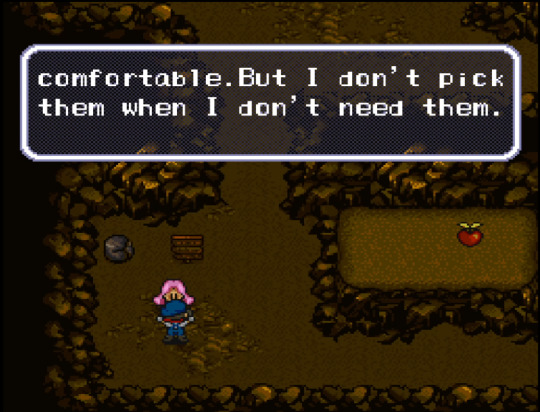
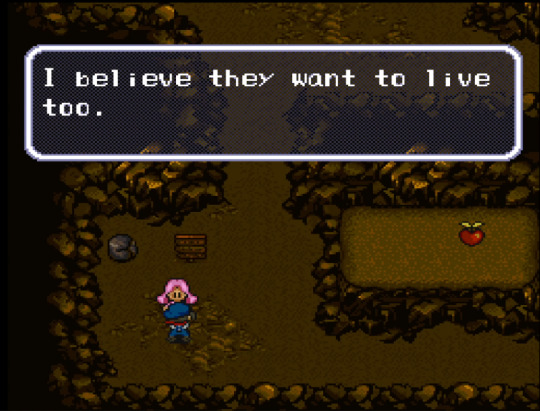
It’s these short little character details that bring life into the game. Each day, you’ll really only see one line of dialogue from each character, be it new or old, with that dialogue usually only changing if there’s a change in season or festival coming up. The repetitive, pretty mindless routine of the game can turn into a sort of meditation if you let it, where you spend your time working thinking about the folks in town and what they had to say to you the previous day. The developers took this concept in stride and gave the side characters loads of dialogue about life, about God and religion, and about… very basic morals, but morals nonetheless. It’s a children’s game after all. When you take the thoughts, questions and prompts the characters give you back to the farm to do your long and tedious routine, you have to ask yourself– what are you working so hard for? For the feeling of accomplishment? Recognition from your peers? For the sake of some higher power, if you worship one? For me personally, it was to write this essay, but it was also for a good grade on the high score screen at the end, so to be honest a lot of this stuff was lost on me until just now when I was reviewing the game to get screenshots.
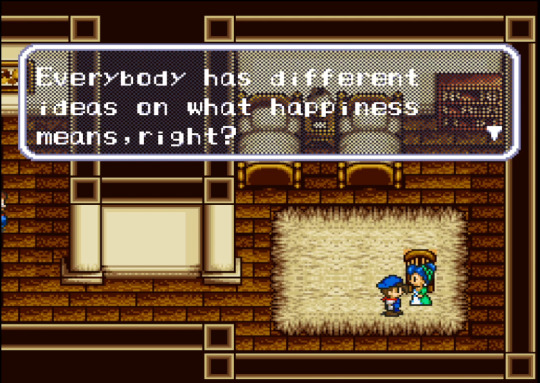
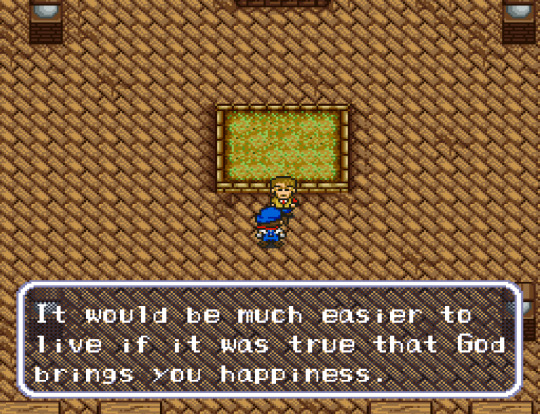
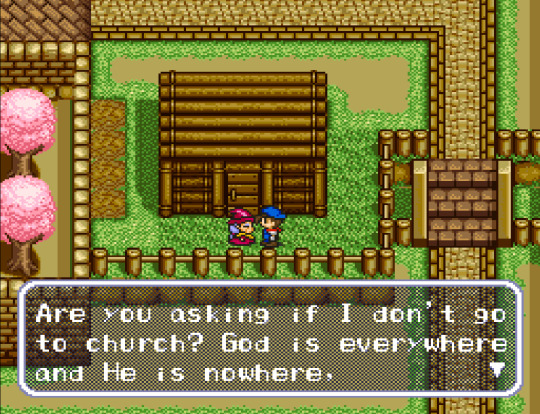
Setting The Standard - Why You Should Play HM SNES
You may read all of this and still think, well, it doesn’t sound like the game has much in it. And you would be right, it’s a very small game, but it’s also extremely quick. On average, my days only lasted about three minutes of real life time. Everything flew by, and I think I finished the game in 20 hours or less. I barely got a chance to notice that there wasn’t much going on because every second of my day was spent busy doing something, and when I wasn’t busy, the break was appreciated. I didn’t start to run out of things to do until I was finished with the second year, and when I looked up what I needed to do to get a decent ending, I was already most of the way there. It was easy to push through those last two seasons to get to the end, and it was so, so worth it.
As I mentioned earlier, the game ends with a high score screen, meaning it has to track all of your accomplishments. These include, but are not limited to: the number of things you ship, number of each crop you grow, number of animals you have and how much they like you, how upgraded your house is, who you married, how much all of the girls in town like you if you didn't get married, how many kids you have (which basically equates to how long you were married), your happiness score (increased by going to festivals and decreased by having animals die), and how many times you’ve pet your dog. In addition to these being tallied up and presented to you, you get special cutscenes not just for each one of these accomplishments, but additional ones for if you managed to do even better! I got a cutscene for having a cow, followed by one for having lots of cows, followed by yet another for having cows that loved me! Watching them play one after the other felt like taking a victory lap even without getting the best possible result. Seeing all of my numbers come up at the end made me want to try again to actually get those other cutscenes, not to get to see them, they’re so easy to find on Youtube, but because the game made it feel like an accomplishment! If I weren’t following this game up by immediately playing its GameBoy port, I absolutely would have started a new file right away. I’ve been playing the Harvest Moon series since I was a little kid and this was the first time I’d actually managed to beat one of these games. I struggle to think the finale of any game following this will feel as good as this one did.

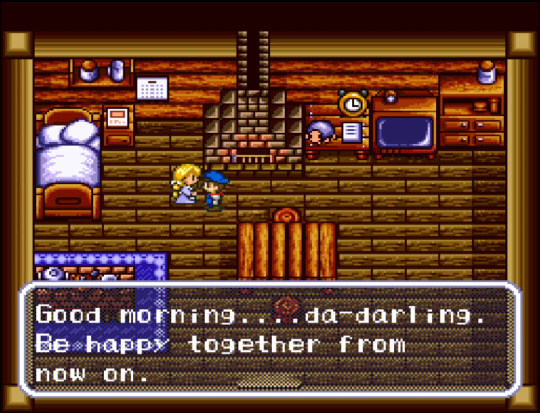
I started writing this whole thing about the fences because it was an easy and silly entry point to get into my core issue with the game, and so I could have an opportunity to dig into game mechanics and the way the knowledge you have of them will completely alter your playstyle, because that’s all fun and interesting for me to talk about. Another reason why I focused on that was because it was near impossible for me to pick any kind of focus point when talking about this game. After all, I’m trying to study a whole series of games that spans multiple decades, and this is not only the first game in that series, but a game that created the whole genre of farming sims and defined that genre so thoroughly that you can see its DNA in every single game that followed.
I didn’t expect much to come out of my experience with this game. My expectations for it before I even picked it up were that it was going to be basically featureless, as informed by my experience with one of the first games I ever played as a child, Harvest Moon GB, which I will get into next. This game was not that at all. I think that everything it did manage to get working right came together just about perfectly. Harvest Moon is exactly what it wanted to be, and where it wasn’t, it lied about how it worked to try and make you play the correct way anyways. When I believed that lie, my time playing was even more enjoyable. Maybe if farming worked just a little bit more like how you’re told it’s supposed to, and if there was just a little bit more story, those would cover the things I felt wanting for the most. But maybe a little flexibility and ambiguity is a good thing. Maybe actually maintaining a fence is just too hard, and maybe if the girls were more fleshed out, I wouldn’t be able to enjoy filling in their gaps in my head.
There are many more things I could say and wanted to say about this game, but this has grown far too long already so I'm cutting myself off here. I'm sure my later entries aren't going to get near this length. If you managed to get to this point, thank you so much for reading!
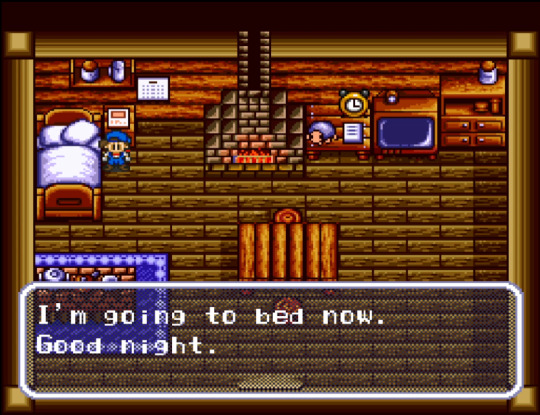
#harvest moon#story of seasons#harvest moon snes#hm snes#game review#m.txt#hm posting#i think i hit the image cap also? it wouldn't let me put in more even though i dont think there are that many. maybe it was a different cap#im happy to answer questions about things i didnt cover here too lol and i have notes from my playthrough if anyone is interested in those#those notes are the only reason i was able to keep all of this straight given how long it took me to write#anyways finally hitting post after like 3 days because i keep forgetting until weird hours
161 notes
·
View notes
Note
this is a stupid question and there’s no reason for my sending it besides trying to understand/overcome my own anxiety/insecurity. your post on game dev software was extremely informative and seems like something you’re really passionate about. for some reason i can’t get past the idea that using premade visual novel/rpg/whatever software will be seen by others as, like, “that doesn’t count as making a real game, you just dragged and dropped stuff into a program someone else made, anyone can do that” or something. I’ve never played any visual novels, but i enjoyed rpgmaker games like The Witch’s House and Ib when i was a kid, and undertale is my favorite game of all time, so I know how good games like that can be. I thought I could learn to make video games at some point by studying computer science in college, but by my 3rd semester i couldn’t focus so i changed my major. That was almost ten years ago, and I feel like an idiot seeing so many people younger than me having so much fun doing stuff that i just gave up on after it became “too challenging” even though I’ve been using computers all my life. I guess what I’m asking is, how do you get over the fear of doing something, saying “hey look what i made/accomplished!” and having someone else say “that’s actually easy to do, you shouldn’t be proud, and here is an example why” and then you’re just left standing there like “damn, maybe i need to reflect on how stupid i am” instead of “man, that guy was a jerk.” sorry if that didn’t make sense.
you have to not think of yourself as yourself, but think of yourself as your friend telling you "someone said mean things to me" and of course when a friend says that to you you say "i will kill them for you you are amazing and the apple of my eye and they dont know what theyre talking about and what you made was great and once again: i will kill them for you". also if anyone says to you "you shouldnt be proud of this thing you made" then you are legally allowed to kill them it's in the world constitution
167 notes
·
View notes
Text
Meeks and Pitts Headcanons (except it's me projecting in all of these)

-> Both of them know how to solve a Rubik's cube and almost always have one around to do something while they're bored. Probably one of them learned it first for whatever reason, then taught the other. And they also like to race to see who solves it first. (and i'm saying this as someone who won't go anywhere without my cube. It's a life style y'know)
-> They're both very geek and nerdy, but Meeks is more of a nerd and Pitts is more of a geek.
-> "Don't worry, I didn't have time to study for this either," they say, but know the whole subject by heart.
-> While Meeks is very sociable, Pitts used to be pretty socially awkward and it took him a while to get genuinely comfortable with all the poets. He is that type of person who's very reserved and quiet, then as soon as he gets used to you he suddenly becomes the most talkative and annoying person in the world.
-> They definitely like boardgames and the rest of this post will be about that, as someone who LOVES boardgames with my whole heart. I know dps takes place before most cool games were invented, but let's just pretend they got to have those in their teenage years. Most of this fandom is constantly pretending stuff didn't happen like canon anyway.
-> Meeks is the type of person who would love games that need tactics and strategy, specially card and deck building games. He would be that type of player that makes the biggest combos (there's always one like that and it is so annoying to everyone else, but he has the time of his life). Like, every single round he manages to do some crazy logical move and win more points than all the others combined.
-> Pitts, on the other hand, likes games with plots, characters, maybe even roleplaying. From more simple games, like Coup to some more complex ones, like Above and Below. And I think he would be more into cooperative games rather than competitive.
-> I particularly think both of them would like space themed boardgames, for some reason I can't explain. Games like Terraforming Mars and Nemesis (I only played this one twice, and each time took like 5 hours, but I swear time FLIES in these games. The other poets would surely complain every time Steven and Gerard decided to play those, because it would take the whole afternoon/night.)
-> Sometimes the other dead poets would agree to play with them. Usually after days of them begging for it. When that happens, they would probably play party games. Those games are faster and easy to learn (there's always someone who struggles to understand the rules, and I think it would be Charlie and Knox, but Charlie would get it as soon as they actually start playing). Games like Exploding Kittens, Cards against Humanity, or even Taco Cat Goat Cheese Pizza (one of funniest games ever btw).
-> Normal card games (like poker, rummy or canasta) are mostly Meek's thing though and he takes it very seriously, although I don't think he'd go as far as betting money on it.
-> Both of them would love RPGs so much.
-> All of those nerdy things might sound stupid to others, but to them, it's a huge bonding moment and it means a lot when they get the others to engage with their hobbies.
💛.
This post feels SO NICHE, bc it has both my love for these two specific characters but also for boardgames. It was fun though, so it's worth it ^^"
#dead poets society#dead poets fandom#steven meeks#stephen meeks#gerard pitts#dead poets society headcanons#dead poets society headcanon#dps headcanons#board games#charles simmons speaks
55 notes
·
View notes
Text
Disjointed DAtVG feelings/opinions
I've played the game for a bit, I'm not too far in yet, and honestly? I hope it gets better. Spoilers & venting below as you might guess.
Everything seems to be tell, don't show. There's very, VERY little trust in the player. Characters happen upon a ruined village? "The village is ruined! There's no one here!" Yes, we can see that. Character looks upset? Text pops up on screen to tell you that IN FACT!! Character is upset. Couldn't have guessed.
Everything is explained out loud immediately, except the arguably actually important things. If I remember correctly, there's no mention of the 10 year (?) timeskip from DAI, everyone just now knows everything about elven magic and the Fade and the Veil EXCEPT FOR THE PLAYER. None of that is explained! New players are expected to just know, which in some games works, but when you throw characters into a magical forest and say it's Arlathan forest, how tf are they supposed to know what Arlathan is.
Why is Varric a brunette all of a sudden
Characterisation of returning characters is fucking wild. Fun, jokey Harding? Massive chip on her shoulder and real aggressive for some reason. Soft-spoken and measured Solas? Yelling, again, for some damn reason. Where is his iambic pentameter? And he hates blood magic all of a sudden?? Did the writers play the earlier games at all? Solas SPECIFICALLY says in DAI that blood magic has no morality to it and is merely a tool.
The game is linear to the extent that I cannot for the life of me see the point of the game asking you to wrap up unfinished business before moving forward. What unfinished business? You've locked us into a small room with 0 exits and 1 chest. There is no business.
So far there's been zero time for any of the story to breathe. There are no story beats, because the drum machine that is the pacing just keeps hammering on. The gravity of the situation has no time to set in for anyone. THE ACTUAL GODS OF MYTH HAVE BEEN BUST OUT OF GOD-JAIL. THIS IS A HUGE FUCKING PROBLEM. "Yeah, well, people would've died if Solas hadn't been stopped from tearing down the Veil." And this is preferable???? What the actual fuck. DAI Solas wanted to rebuild and to safe-guard his people. TWO of the people he wanted to PROTECT EVERYONE FROM are now out. But oh man, that Solas, he would've hurt folks. You think the wondertwins won't? Jesus fucking Christ.
The gameplay more or less just completely scraps character classes. Playing a mage rn and for some damn reason she has separate ranged attacks. What the actual fuck. What is the point of making people choose a class if a damn mage has to stand next to enemies to attack?
So far doesn't feel like an RPG at all. Starts in media res which is fine, but your character is already established as a cool hero and an important figure. Why? Why weren't we along for that ride?
Character movement is janky af, DAI was much smoother 10 damn years ago. Hopefully they'll somehow manage to fix it.
Either they needed better actors or a much better voice director, because holy shit is the dialogue awkward and halting and just... no.
Writers have clearly had shoes far too large to fill. Dialogue wants to be funny and witty and clever. It is not. Specially not with the phoned in voice acting.
Where have my Welsh/Irish elves gone? Wtf happened there? Also why wasn't there anyone around to tell the actors how to pronounce the elvhen words??
Why the fuck is the rogue our healer.
All quests so far have been walking from A to B, collecting some coins along the path, and then fighting 5 or 10 enemies. No variation at all.
Idk man, I really hope the game will find its legs as it goes on, but so far? Massively underwhelming and honestly quite disappointing. Absolutely does not feel like DA. People critisised DA2 for being rushed and DAI for a whole host of shit, but at least I felt like I was playing a Dragon Age game.
42 notes
·
View notes
Text
Death - S. Carter (Full Metal)

Summary: you never think the last time is the last time, until it is.
Warning: sadness. death.
I wasn't due on the ship for deployment for another week even if Alpha team was going now to start the turnover for Bravo, but something in my gut was telling me to get on that plane and head out with the guys so that's exactly what I did.
"You're coming a week early?"
I nodded as I looked up at Alpha One. I was the team medic so I didn't have to go onto ship until deployment actually started which was in a week from bow but since Metal and I were on different teams now it would give me a chance to see him too since we're going back to back for deployment.
"Kind of bored at home."
"Right. It wouldn't have anything to do with Metal being deployed with Bravo right now would it?"
I shrugged and smiled.
"I better not catch you two having sex in the equipment room again."
"That was years ago now, you need to let that go."
He chuckled.
"Glad you're here (Y/N)."
I smiled as he walked off towards the boys and I got as comfortable as I possibly could and closed my eyes. This was a long flight and the least I could do was try and get some sleep.
Before I knew we had made it to ship and I was unpacking my bag when there was a knock on the doorframe. I smiled as I looked back over my shoulder and saw Metal standing there.
"Hey pretty girl."
"Hey you."
"You didn't tell me you were coming early."
"Kind of decided last minute. Thought I'd surprise you."
He nodded as he walked over to me and wrapped his arms around my waist and leaned his head onto my shoulder.
"What do you say we make up for lost time?"
"You better lock the door, your replacement still talks about that one time he caught us years ago."
Metal laughed.
"Let's just leave the door open and give anybody who walks by a show."
"You're crazy Scott Carter."
"Crazy about you."
Metal started kissing my neck and it was over from that moment on. I kicked the door closed at some point and just enjoyed being with him after weeks away from each other.
It was the middle of the night when his phone went off. He gave me a quick kiss and we said our I love you's and be safe before I rolled off his chest. He quickly got out of bed, got dressed and he was out of the door. I was used to this routine. This was the life we chose.
Whem morning rolled around I wandered around the ship for a bit until my phone started ringing. Lisa. I quickly answered the phone and brought it up to my ear.
"You're on ship right?"
"Yeah, what's up?"
"Sierra Whiskey call from Bravo One. We need you on deck when the helo gets here."
"Who is it?"
"Don't know yet."
"I'll be there."
When I ended the call I started running towards the deck praying to god that Scott wasn't the origin of the Sierra Whiskey call and that if he was that he would be okay. When I got on deck I was met with Lisa, the lieutenant commander for Bravo and the lieutenant commander for Alpha and I could tell by the looks on their faces that it wasn't good news.
"It's Metal isn't it?"
The lieutenant commander for Alpha nodded.
"How bad?"
"He got the brunt of the hit of an RPG. Helo is getting ready to head out to get him now."
I nodded as I swallowed the lump in my throat and I quickly pulled my hair up into a ponytail
"Is that the helo?"
"Yes."
I nodded as I started walking over to the helo.
"Petty Officer (Y/L/N) you cannot get on that helicopter. Full Metal is Bravo now. We just asked you here for your assistance."
"What is Scott's call sign?"
"He still goes by Alpha One."
I nodded.
"That means he's still a member of Alpha team. If Scott lives, you can discipline me any way you see fit Lieutenant, but if he dies we will never speak of this again."
"You two are together, I can't authorize this."
"Let her go. This might be the last time she sees him alive."
I looked over at the Lieutenant Commander for Bravo and nodded before I quickly got on the helo and strapped in.
When we landed and I saw Jason carrying Metal I knew it was bad. The guys quickly got him in the helicopter and Clay looked at me.
"You good?"
"Yeah, get me the med bag."
I ripped open Scott's shirt and assessed the damage and inhaled sharply. His chest was tore up. I took a deep breath and tucked my hair behind my ear.
"Right side of his chest isn't rising when he breathes."
I nodded at Jason's observation.
"Tension pneumothorax."
I looked down at my shaky hand as Clay handed me the needle decompresssion kit.
"You ever did one Clay?"
"Only on a pig."
"First time for everything. Switch with me."
Clay and I switched positions and I quickly clipped in as I focused my attention back on Clay. I talked him through putting the needle into Metal's chest and I sighed as a gush or air came out.
"Okay we're good. Give me some gauze so I can pack the rest of his wounds."
Clay handed me some gauze and I looked up at Metal's face as I pressed down on some bleeding.
"Come on baby. Stay with us."
"Incoming."
I looked over and saw the RPG headed straight for us. I hit the ground of the helo and Clay swiftly covered his body with mine. In the mist of everything I didn't grab any gear.
In the middle of getting shot at Scott started coughing and I let out a breath I didn't even know I was holding. He was awake which was a good sign.
"What's going on?"
He tried getting up and Jason quickly pulled him back down by his shoulders.
"Easy buddy."
"What's happening?"
"You were hit with an RPG baby. We're flying you back to ship now."
"(Y/N)?"
"Yeah, I'm here."
"Can I get some morphine?"
I chuckled.
"Yeah. Yeah of course."
Once the shooting stopped Clay handed me a needle and some morphine from the med kit and I stuck it in Metal's arm.
"Your blood pressure is low so I can only give you one."
"Oh come on, my mom put more in my sippy cup when I was a baby."
I chuckled.
"Is it helping at all?"
"Yeah but it's not reaching my leg."
I furrowed my eyebrows.
"You're leg?"
I crawled over to his legs, hooked a finger into a hole in his pant leg and pulled it open. Shit his femur was broken.
"Clay get me the stabilizer kit."
"Okay baby this is going to hurt."
"Mhmm."
With Clay's help I stabilized Scott's leg and I crawled back over to his chest to continue packing his wounds. Scott put his hand down on my lap and I forced out a smile at him.
"You're gonna be okay."
"Two mikes out from ship."
"Babe do me a favor."
I nodded.
"Anything."
"Don't let the guys know I'm not actually made of Metal."
I chuckled.
"Ok it'll be our little secret."
"I love you so freaking much (Y/N)."
"Don't do that Scott. You're going to be okay."
"And if I'm not, I want you to know you're the best damn thing that's ever happened to me. I'm sorry I couldn't give you the life you imagined for yourself. Lean on the guys, they'll be there for you."
I shook my head as the helo began it's descend onto the ship.
"My life is perfect the way it is. I love you Scotty. Now hurry up and get better."
"I'll do my best love."
Scott was rushed off the helicopter and to the team doctors and Jason, Clay and I quickly got off the helicopter too.
"Metal's stable."
The lieutenant commander for Bravo nodded and he looked over at me.
"I know what's coming for me."
"What's that mean?"
"Means I'm probably gonna have to find a new job. Excuse me."
"Debrief can wait until Senior Chief Carter is out of surgery."
I nodded.
"Thank you for what you did Lieutenant."
He nodded.
"Of course."
"Whatever is going on here we've got your back (Y/N)."
I shook my head at Clay.
"I'm not gonna drag you down in my mess but thank you for that. Means a lot."
I put my head down and headed inside and sat down in the hallway as I waited for the doctors to come out with an update on Metal.
"Petty Officer (Y/L/N)?"
I looked up at the Lieutenant Commander for Alpha and shook my head as I saw the look on his face.
"No.."
"I regret to inform you of the passing of Senior Chief Carter."
"What happened? He was stable."
"The doctors will be out here to explain everything. I'm so deeply sorry (Y/N)."
I nodded.
"Can I debrief now? Get it over with."
"Don't worry about it."
I nodded as I hugged myself as I started bawling. I knew the danger of this job but I never thought he would die. I guess you never know the last time you see someone is going to be the last time.
The doctors came out and explained everything and I tried to focus but I couldn't. Once the doctors left I was so numb, I walked up to the deck and saw the helo carrying the rest of Bravo team descending onto deck.
Lisa stood by most likely waiting to tell the rest of the team that the love of my life was dead. I watched as they all got off the helo and walked over to Lisa. She spoke and Trent looked over at me and I swallowed the lump in my throat. He dropped his gear and walked over to me and wrapped his arms around me. I clung to him as I broke down crying and it wasn't long until everybody from Bravo had their arms wrapped around me.
I was on Alpha team but Bravo team felt more like a family to me than Alpha ever did. We stood there for a long time and Bravo had my back even once we were back stateside.
One by one they would come by and make sure I was okay. That held through especially after I found out I was pregnant, which in itself just felt like a cruel joke because I had always wanted kids but I was told early on in my career that my chances of carrying a pregnancy were slim to none because of exposure to some poisonous gas so I had made peace that I wasn't going to be a mother. Now with only a few weeks left before baby Carter's arrival I was preparing to be a single mother.
A knock on the door snapped me out of my thoughts and I furrowed my eyebrows as I walked to the door because I wasn't expecting anybody. I pulled open the door revealing Trent, Brock, Clay, Sonny, Stella, Ray, Naima, Jason, Emma and Mikey.
"Where's that crib at? I'm dang near an expert at building those now."
I chuckled.
"You guys didn't have to do this."
"You're family (Y/N). And so is this little guy. Put us to work."
I smiled.
"Second door on the right Sonny."
I smiled as everybody pilled into the house that Metal and I once shared.
Lean on the guys. They'll be there for you. Metal couldn't have been more right about that one. Baby Carter was going to have a big family and even if his dad isn't here he was going to have enough male role models in his life.
#seal team#seal team imagines#seal team x reader#seal team imagine#full metal seal team#full metal imagine#full metal x reader
43 notes
·
View notes